Last updated 10 March 2021
RAAF ANSONS and OXFORDS ON SOUTH AUSTRALIAN FARMSLarge numbers of retired RAAF Airspeed Oxfords and
Avro Ansons, sold from South Australian
RAAF Stations at post-war military disposals sales, have been tracked down across SA Compiled by Geoff Goodall
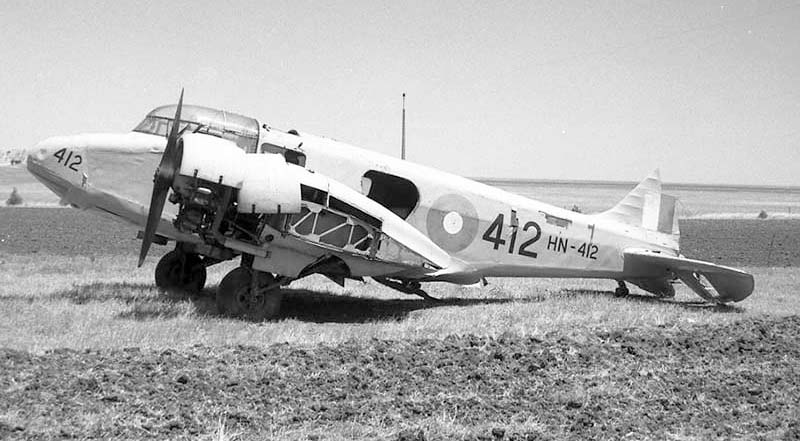 This RAAF Airspeed Oxford HN412 was by
far the best preserved of the 150 Oxfords and Ansons located. It was found on a farm at Agery SA in February 1965,
after being kept in a barn for 15 years. All over yellow with
Pacific blue & white roundels.
Photo by Geoff Goodall
As proof that aviation history comes in many different forms, this
page describes the disposal of 250 RAAF Avro Ansons and Airspeed
Oxfords in South Australia after World War II. The majority were
purchased by farmers and towed home on their main wheels with the tailwheel attached to trucks or tractors.
Others went to Adelaide suburban homes as childrens play houses, or
country garages as a source for metal tubing and electrical wiring
during the austere postwaryears.
The backgroundThis listing is based on inspections of the remains of those aircraft on farms and towns in 1964-1967, when numerous country expeditions by West Beach Aviation Group members located nearly 150 Ansons and Oxfords. All had suffered from long exposure to the weather, others had been broken up to just a collection of faded yellow parts, but wherever possible, their RAAF serials were established from the components that remained. During 1974, WBAG members Nigel Daw, Dave Vincent and Kev Gogler spent a total of 13 days on the road, re-visiting many of the known aircraft and finding additional aircraft. Nigel also visited Mount Gambier in the far south east of SA, where his detective work located more aircraft, 5 Oxfords and 6 Ansons sold from the wartime Mount Gambier RAAF station. A decade later, Adelaide aircraft restoration enthusiast John Boden and his son John, re-visited many of the known farm airframes and also tracked down previously unknown aircraft. They were building up their parts collection for Anson restoration projects. In their quest for authentic components for fuselage, cabin, cockpit and engines, the Bodens collected parts from the following aircraft A4-18, A4-22, A4-26, N4955, R9888, W1538, W2589, AX350, AW796, AX267, DG728, DG824, DJ507, LV131, MG191, MG522, MG735, MG972.
|
|||||||||
| The DAP "aircraft remnants" sales |
|||||||||
The
DAP decided the cheapest way to dispose of so many aircraft was a
series of auction sales at RAAF stations around the country. These sales were
advertised in the local newspapers by the Commonwealth Disposals
Commission as "Scrap Aircraft Remnants", describing complete aircraft as
"fuselages including aircraft remnants". 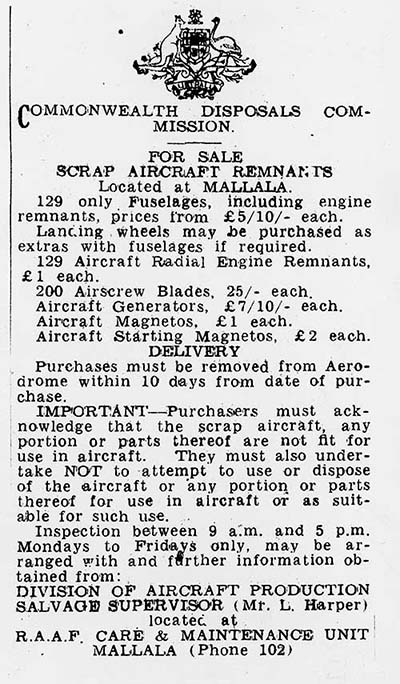 "The Advertiser" newspaper, Adelaide 8 September 1947 Low prices were necessary to make them attractive to the public, especially farmers who were short of so many routine items from years of wartime rationing and diversion of day-to-day items to the military. Each aircraft had wheels, hydraulic systems, electrical systems, lengths of electrical wiring and metal control cables, fuel tanks (some still containing gallons of precious fuel), tubular metal frames or wooden paneling, plus a variety of other items like hinges, pulleys, light globes, seats and perspex windows. Oxfords were popular as huts and their wood panels were used as cladding on farm structures and to construct caravans in several cases. Standard sale prices were agreed on: usually £5/10/- per Anson or Oxford to ensure quick sales. To justify these low prices they were advertised as "fuselages with engine remnants", and "aircraft shells" with all equipment necessary for flight removed: however the removed parts were listed as available for separate sale: wheels at £4/10/- each, plus magneto, generator, starter, propeller, hydraulic pump, air compressors, lights, fire extinguishers. All this belied the fact that many of the aircraft were in reasonable condition, complete on their wheels with wings attached, and most cockpit and interior fittings. They were weather-beaten after being retired in the open for several years since wartime training was suspended. In reality, RAAF stations had been wound down to minimal post-war ground staff, and did not have the capability to remove parts from large numbers of aircraft. So it became buyer’s luck whether their aircraft had in fact been stripped. The majority seem to have retained their propellers. The sales paperwork included a declaration that the aircraft were sold as scrap and parts could not be used on flying aircraft. To ensure this, each aircraft was expected to exit the RAAF station through the main gates. So the aircraft had to be broken up, or, as was much more common, wings hacked off outside the engines so that the fuselage could be towed backwards on its main wheels behind a tractor or truck. Purchasers were given 10 days to remove their aircraft from the RAAF station. In Adelaide, road traffic problems were caused by the Mallala sales aircraft being towed, with their wheel base barely fitting on the main roads of the time, forcing all other vehicles off the road. Police escorts were required from Gepps Cross for those aircraft being towed through the Adelaide suburbs. There are anecdotes of some enterprising purchasers, unwilling to cut off the outer wings, towing the complete aircraft with tailwheels attached to tractors or trucks, across the airfield and out through gaps made in boundary fences - usually under the cover of dawn or dusk when there were few RAAF personnel around. |
|||||||||
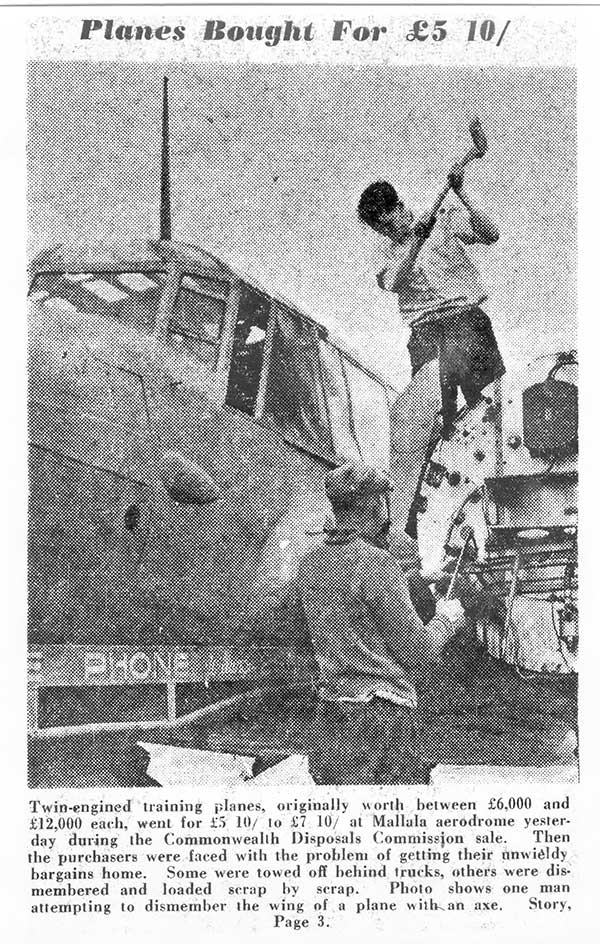 |
|||||||||
|
Newspaper clipping of civilian purchasers using an axe to detach the wings of an Anson at the RAAF Mallala sales in
September 1947. John Boden points out that the electrical box at
the top of the port engine firewall was RAAF Anson Mod. No.512 for the
installation of T1154 R1155 radio: thus making this Anson LT711, MG779 or
MG780.
 K8173 has been loaded on the truck above W1529's outer wings, but the angle made the tail too high to get under power lines along the road home, so the vertical fin and rudder have been laid flat - the nose was too low, so it was cut off and loaded on the 4 wheel trailer behind, to which W1529's tailplane was attached to be towed backwards on its main wheels. Photo: Janette Smith, via John Deckert |
|||||||||
No official
records giving the names of the purchasers at these DAP "aircraft remnants" sales have
ever been located, despite a receipt being written for each purchase. Each RAAF aircraft record Status Cards (Form E/E.88) simply ends with
“Disposal by DAP" and a date. The following listing covers aircraft located across South
Australia commencing in 1965, almost twenty years after the sales. Some had been carted away from farms as scrap but
their identities were established by pictures in family photograph albums – or other means, such as
log books that came with the aircraft, or cowlings or panels with serial numbers hand-painted inside by ground crews. Most
aircraft were in yellow trainer paintwork, often with original brown
and green camouflage visible underneath the yellow paint layer.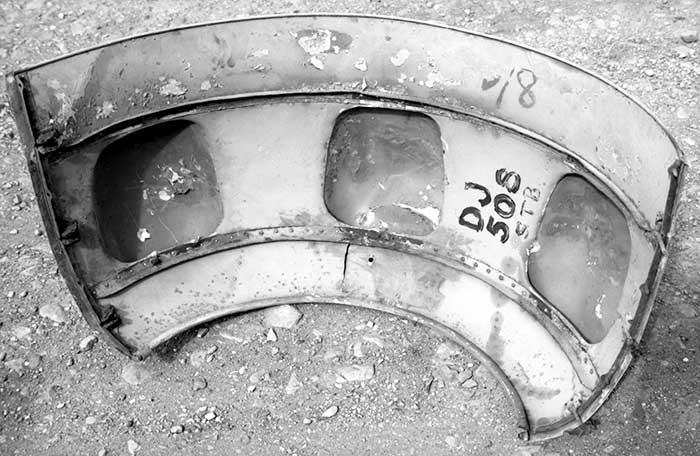 How some aircraft were identified: this starboard engine cowling section removed from the Cheetah engine of an Anson
on a farm at Clare SA revealed its former RAAF serial DJ508. Photo by Arthur Perkins 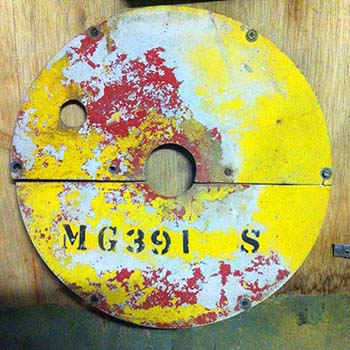 This starboard wheel cover from MG391 at Port Broughton confirmed its serial. Courtesy John Boden Anson and Oxford “aircraft remnants” sales were held at a number of RAAF stations around Australia during 1947. They were advertised in local newspapers, with a closing date for bids at the set prices. Inspection was permitted to allow bidders to nominate the aircraft of their choice depending on condition and what parts had been removed. The successful bidders were then notified by mail and were given 10 days to remove their aircraft from the RAAF station. Those advertisements in South Australia were:
Attempts to reconcile these numbers against "DAP disposal" dates on the Anson and Oxford RAAF airframe record cards give confusing results. For example, Ansons positively identified on farms indicate that at least 8 additional Ansons were sold from Port Pirie in addition to those expected. At Port Pirie RAAF Station, some
aircraft had been dumped in a remote area on the airfield boundary. In February 1966
this area was located, still fenced off with rusted barbed wire. Here
aircraft had been burnt and covered with
earth. By 1966 fuselage frames protruded from the ground, including at least 8
Ansons, 3 Oxfords, 14 Fairey Battles and 3 Wackett Trainers.
|
|||||||||
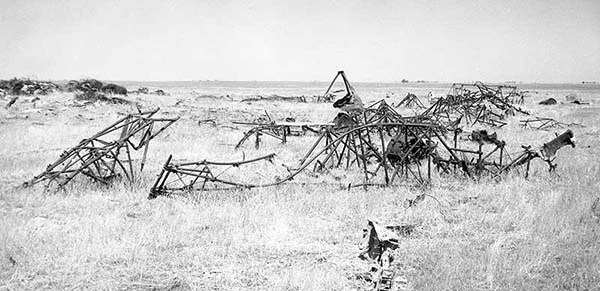 |
|||||||||
| Burnt and buried Fairy Battle and Anson fuselage frames at the Port Pirie airfield dump, February 1966. Photo by Geoff Goodall |
|||||||||
RAAF ANSONS LOCATED IN SOUTH AUSTRALIA
|
|||||||||
| A4-18 Curramulka Ex RAAF Mallala Mr. N. Agnew’s farm. The fuselage had been detached and in late 1950s was moved to Mr. L. Hutton’s property at Mount Compass Yellow, large black “6” on nose faintly discernable, possibly prewar marking. - By 1967 the Curramulka property had been abandoned. All that remained of the Anson were the two engines nacelles standing on undercarriage legs connected by the wooden wing spar. One Cheetah still fitted. Cowling section marked R9885 on site. - By 1974 in similar state. By 1980s the fuselage at Mount Compass had been reduced to small section of frame and nose. |
|||||||||
| A4-23 Mallala Ex RAAF Mallala Mr. Davey’ farm, less than a mile from Mallala RAAF Station. Original model Anson with short nose, sloping windscreen. Avro plate: built June 1937.Yellow over silver. “17” on the nose in dark blue paint. (Subsequent research has revealed that 6SFTS at Mallala painted individual aircraft codes on both sides of the nose and rear fuselage in blue rather than the usual black) By 1966 stripped fuselage frame still standing on undercarriage, cockpit windscreen and nose in good condition. Insides of engine cowlings had serial hand-painted as “423”. - By 1980 the nose and windscreen had been removed by an unknown restorer. - Later the nose and windscreen were acquired by Ron Lee, Melbourne to assist his planned restoration of N1334, which he collected from a farm at Mildura Vic. N1334 was another sloping windscreen model but its windscreen was in poor condition. By 2000 Ron Lee stored N1334’s dismantled and unrestored fuselage in the rear of the Airworld hangar at Wangaratta Airport Vic, where he was based as an aircraft ground engineer. - In December 1982 John Boden, Salisbury, Adelaide hoped to obtain A4-23’s fuselage frame to mate with W1538 as a restoration project, however Mr. Davey would not agree. - By 1987 A4-23’s fuselage frame had been acquired by Foss aviation museum project, and stored in a building at West Croydon, Adelaide. Also there were Sea Venom WZ931 and Aero Commander VH-AVT. Museum project was disbanded later in 1987. |
|||||||||
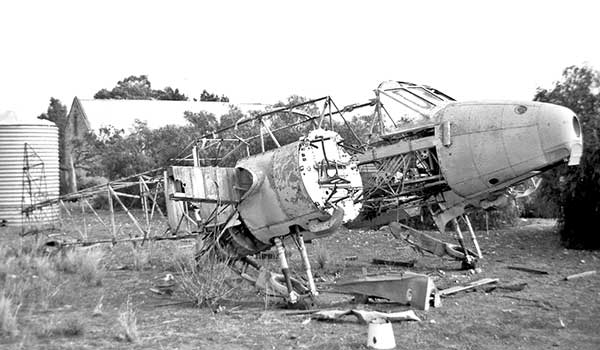 |
|||||||||
| A4-23 on a farm at Mallala in May 1966. All woodwork and fittings have been stripped from the fuselage frame. Photo by Geoff Goodall |
|||||||||
| A4-26 Clare Ex RAAF Port Pirie, Mr. J. Hawker, “Anama”, Clare. Towed from Port Pirie backwards on its main wheels, with tail wheel attached to a truck tray Original model short nose, sloping windscreen. Avro plate: built June 1937. Yellow over camouflage. “A4-26” on the nose in black. towed back on wheels behind a truck By 1966 standing on undercarriage, decomposing outer wooden wings on the ground nearby. - Mr.Hawker allowed removal of nose section with windscreen by the West Beach Aviation Group in May 1966. This section was moved to Adelaide secured to the roof rack of member John Smith's Holden station sedan. Stored at Parafield Airport, Adelaide where collected by Pearce Dunn on 16 April 1972 and moved to his Warbirds Aviation Museum at Mildura, Victoria. - Later sections of the fuselage frame were salvaged by John Boden, Salisbury, Adelaide. Used to build up a complete Anson fuselage based on A4-37 restored by his son John, at Lewiston SA and painted in RAAF pre-war silver finish as A4-37. |
|||||||||
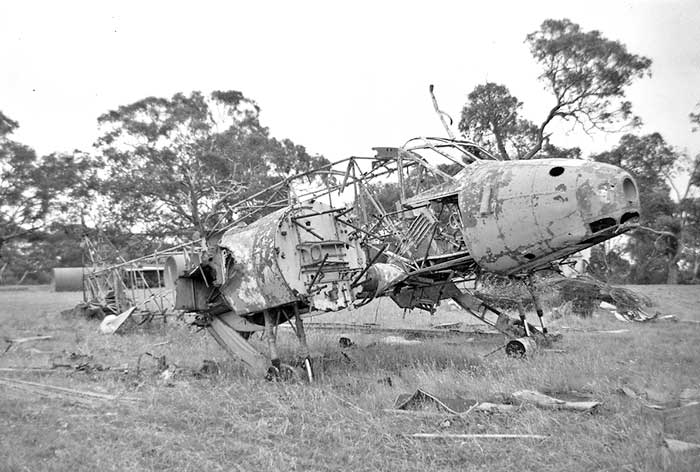 |
|||||||||
| A4-26
at Clare, January 1966, yellow over
camouflage.
Photo by Geoff Goodall |
|||||||||
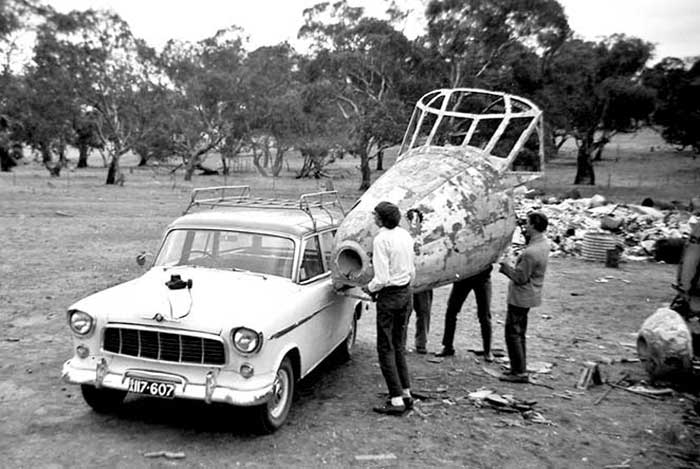 |
|||||||||
| Loading A4-26’s nose section on to the roof rack of John Smith’s Holden at Clare,SA in May 1966. Mike Vincent in foreground, Melvyn Davis on right. Photo by Geoff Goodall |
|||||||||
| A4-37 Clare Ex RAAF Port Pirie, Mr. J. Hawker, “Anama”, Clare. Towed from Port Pirie backwards on its main wheels, with tail wheel attached to a truck tray Original model short nose, sloping windscreen. Avro plate: built June 1937. Yellow over camouflage. “37” on the nose in black. By 1966 standing on undercarriage but fuselage frame in very poor condition, with nose severed. Decomposing wooden wings were on the ground nearby. - airframe collected by John Boden in October 1980 and moved to Adelaide where restoration commenced in a workshop at his home at 14 Hooper Street, Salisbury North. Because of its poor condition, the original intention was to restore just the cockpit and nose. However the fuselage frame was used to build up a complete Anson fuselage. It based on the frame of A4-37, apart from some tubing around the centre-section, a section of fin from W1538 and some tubing in the rear fuselage from A4-26. By 2015 the restoration of the complete fuselage, tailplane and cockpit interior has almost been completed by his son John at his property at Lewiston SA. It is painted in RAAF pre-war silver finish as A4-37. Construction of new-built wings is not being considered. |
|||||||||
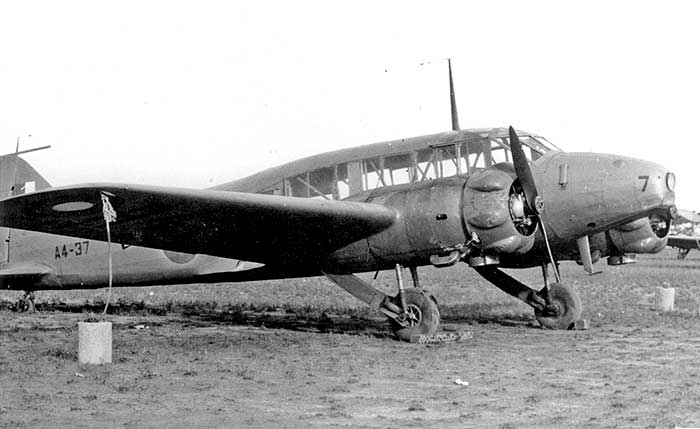 |
|||||||||
| A wartime photograph of A4-37 in service with 6SFTS at Mallala, in foilage green camouflage. It was later repainted trainer yellow with "37" on the nose in black. Photo: Geoff Goodall collection |
|||||||||
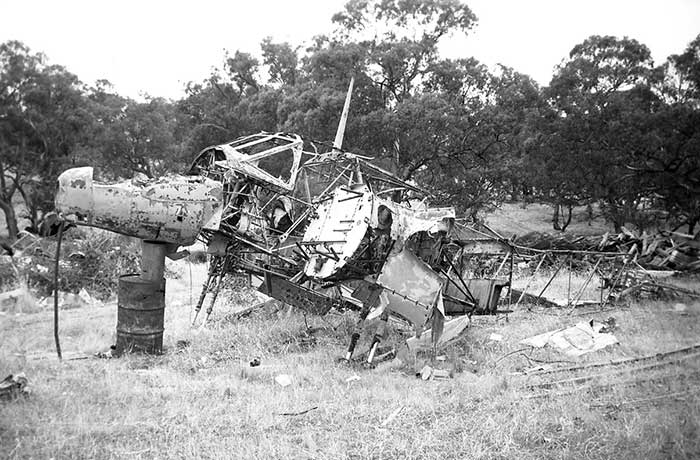 |
|||||||||
| A4-37
at Clare, January 1966.
Photo by Geoff Goodall |
|||||||||
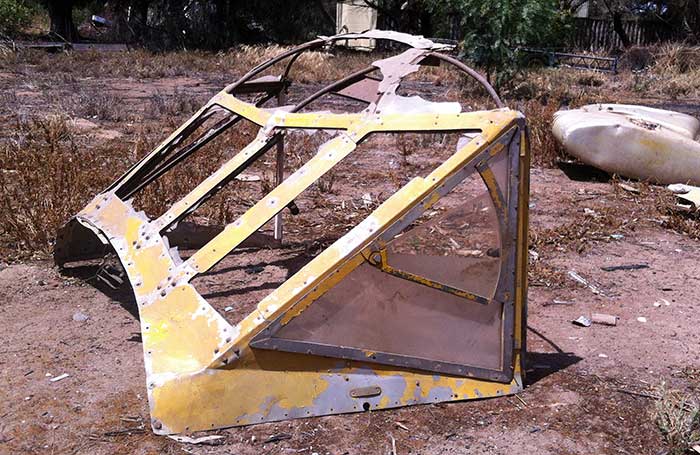 |
|||||||||
| The
early model Anson sloping windscreen removed from A4-37 at
Clare.
Photo by John Boden |
|||||||||
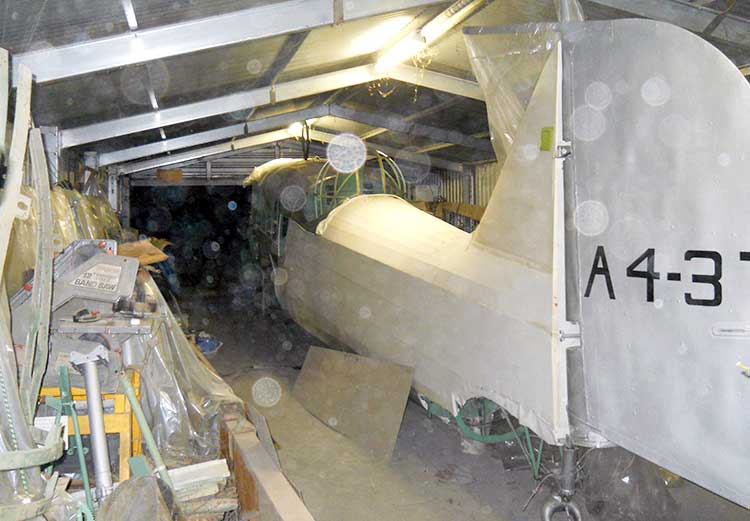 |
John
Boden's remarkable restoration of A4-37 in 2013, complete with dorsal
turret.
Photos John Boden Junior
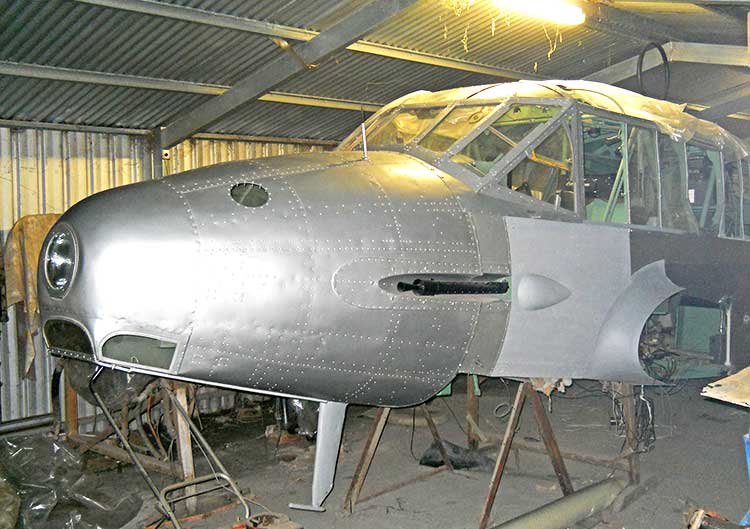 |
|||||||||||||||||||||||||||||||||||||||||||||||||||||||||||||||||||||||||||||||||
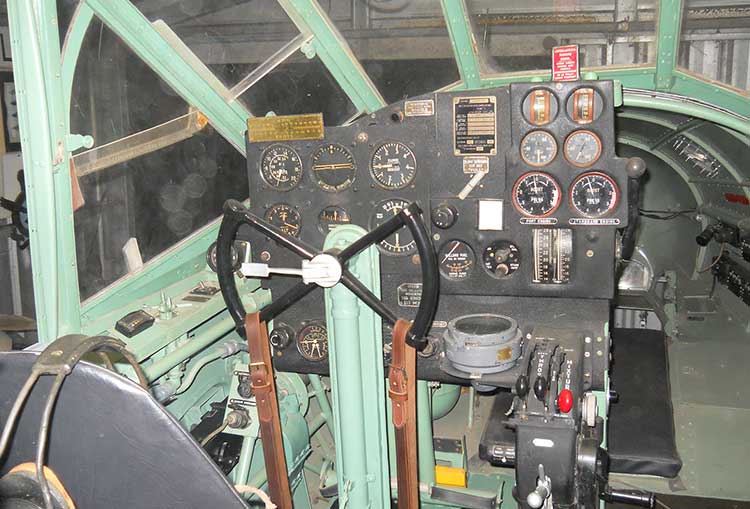 |
|||||||||||||||||||||||||||||||||||||||||||||||||||||||||||||||||||||||||||||||||
| K8713 Yorketown Ex RAAF Mallala Mr.G.P. Daniell’s farm on Port Giles road, Coobowie. He also purchased Anson W1529 and the two were moved by road from Mallala together: K8713 was loaded on a lorry with the fin and rudder laying flat to reduce overall height and nose section cut off to reduce length. The nose was carried on a towed trailer, on which W1529's tail was attached so it could be towed backwards on its main wheels. It is reported that Mr. Daniell's neighbour Bob Scott assisted moving the two Ansons and he kept K8713. Yellow, fuselage and nose code “52” By 1974 all that could be found of K8713 was the nose section, which had been detached at Mallala in 1947. |
|||||||||||||||||||||||||||||||||||||||||||||||||||||||||||||||||||||||||||||||||
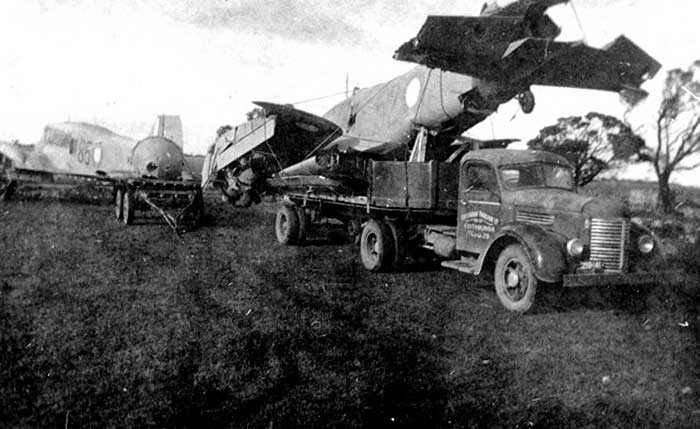 |
|||||||||||||||||||||||||||||||||||||||||||||||||||||||||||||||||||||||||||||||||
| These three pictures show K8713 code "52" arriving at Coobowie from Mallala in 1947, with W1529 towed behind. Photos courtesy Janette Smith, via John Deckert |
|||||||||||||||||||||||||||||||||||||||||||||||||||||||||||||||||||||||||||||||||
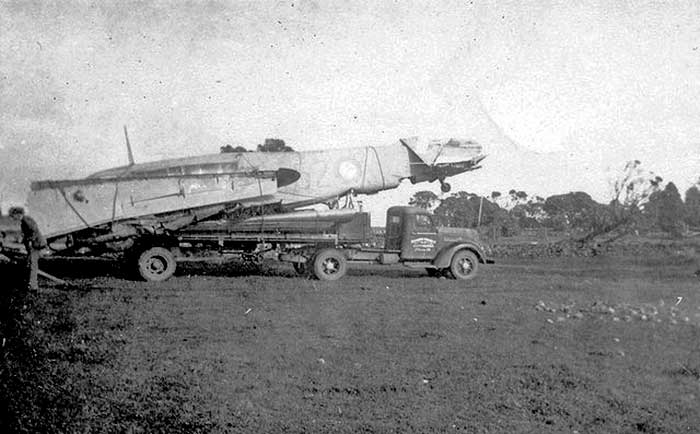 |
|||||||||||||||||||||||||||||||||||||||||||||||||||||||||||||||||||||||||||||||||
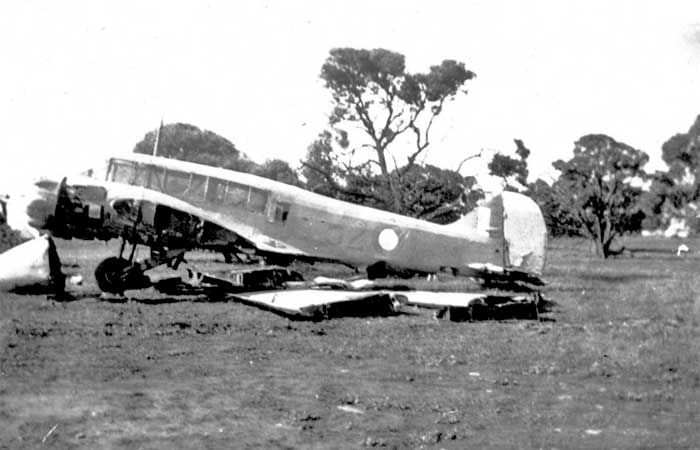 |
|||||||||||||||||||||||||||||||||||||||||||||||||||||||||||||||||||||||||||||||||
| K8713 unloaded at the farm, its nose and wings on the ground, fin and rudder bolted back in vertical position. |
|||||||||||||||||||||||||||||||||||||||||||||||||||||||||||||||||||||||||||||||||
| N1330 Hamilton Ex RAAF Mallala Mr. Gordon Laubsch’s farm, between Hamilton and Kapunda. Original purchaser was Mr. Higgins of Kapunda, who later gave the aircraft to Mr.Lausch. Yellow. By 1966 all that remained were Cheetah engines and cowlings. |
|||||||||||||||||||||||||||||||||||||||||||||||||||||||||||||||||||||||||||||||||
| N4912 Waikerie Ex RAAF Mallala Purchased at Mallala by Messrs A. L. & R. K. Neideck of Waikerie. Broken up on the farm property. The only remnant found by Dave Vincent in October 1974 was the nose section on another farm in the district, in the farm's chicken house. The external surfaces had been repainted, but Dave gained permission to scrape off the new paint and the full serial N4912 was revealed. This was unusual because RAAF Ansons usually had only a two or three digit code painted on the nose - however a wartime photograph of N4912confirms that aircraft had the full serial on the nose. |
|||||||||||||||||||||||||||||||||||||||||||||||||||||||||||||||||||||||||||||||||
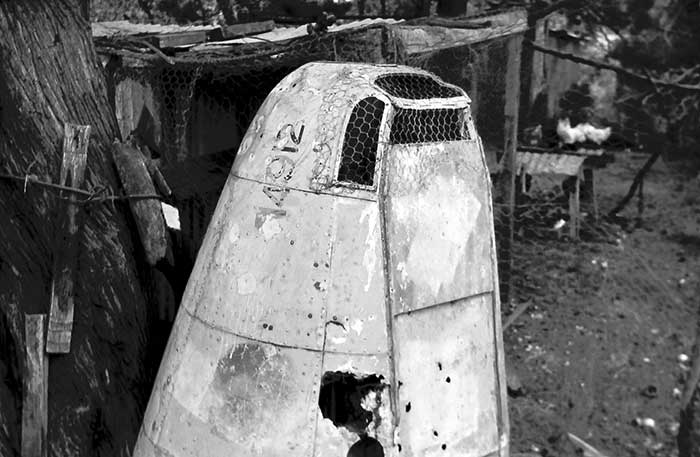 |
|||||||||||||||||||||||||||||||||||||||||||||||||||||||||||||||||||||||||||||||||
| Anson nose in a Waikerie chicken run in October 1974 with paint scraped off to expose the RAAF serial N4912. Photo by David Vincent |
|||||||||||||||||||||||||||||||||||||||||||||||||||||||||||||||||||||||||||||||||
| N4918 Greenock Ex RAAF Mallala Mr. Henry Wendt’s farm. He also had Anson AX147 and some Mustang sections, purchased from Mallala. Yellow over silver paintwork. By 1980s scattered parts only. Identity unconfirmed, engine cowling “N..18” |
|||||||||||||||||||||||||||||||||||||||||||||||||||||||||||||||||||||||||||||||||
| N4955 Balaklava Ex RAAF Mallala Mr. R. Hudson’s farm. He also had an Oxford from Mallala Yellow, nose code "4955" By 1984 only the nose section and Anson "helmet" cowlings remained. These were acquired by Bob Davis, who by 2016 had restored the nose and was working on the cockpit interior. He also has two Cheetah engines, one of which is being rebuilt to run. |
|||||||||||||||||||||||||||||||||||||||||||||||||||||||||||||||||||||||||||||||||
| N4965 Ardrossan Ex RAAF Port Pirie Mr Woods’ farm, Petersville via Ardrossan Yellow By 1966 only scattered parts left. Mr. Woods had kept its airframe and engine logbooks |
|||||||||||||||||||||||||||||||||||||||||||||||||||||||||||||||||||||||||||||||||
| R3378 Gawler Ex RAAF Mallala Mr. Don Tozer, “Concordia”, Concordia near Gawler. Towed to the farm, along with Don Urlwin's Anson R9888. The two Ansons were parked near each other on the farm. The port engine of R3378 was maintained serviceable with propeller attached and was started up on occasion. Later the aircraft was stripped for parts then broken up. Yellow, nose code “79” By early 1980s only scattered parts remained |
|||||||||||||||||||||||||||||||||||||||||||||||||||||||||||||||||||||||||||||||||
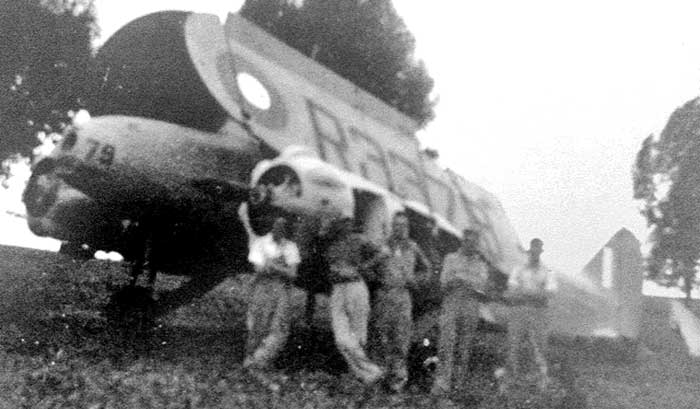 |
|||||||||||||||||||||||||||||||||||||||||||||||||||||||||||||||||||||||||||||||||
| R3378 nose code "79" on arrival at the Concordia farm from RAAF Mallala in 1947. All three photos: John Boden collection |
|||||||||||||||||||||||||||||||||||||||||||||||||||||||||||||||||||||||||||||||||
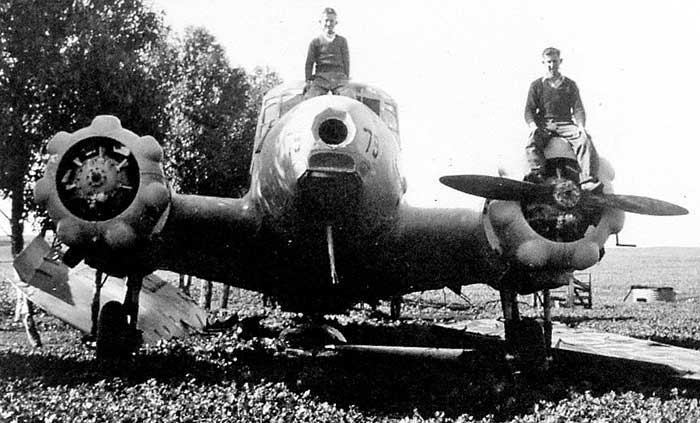 |
|||||||||||||||||||||||||||||||||||||||||||||||||||||||||||||||||||||||||||||||||
| Proud Anson owners. Don Tozer (R3378 code "79") and Don Urlwin (R9888 code "18") pose on R3378 after the lashed wings had been removed and left alongside in the grass. |
|||||||||||||||||||||||||||||||||||||||||||||||||||||||||||||||||||||||||||||||||
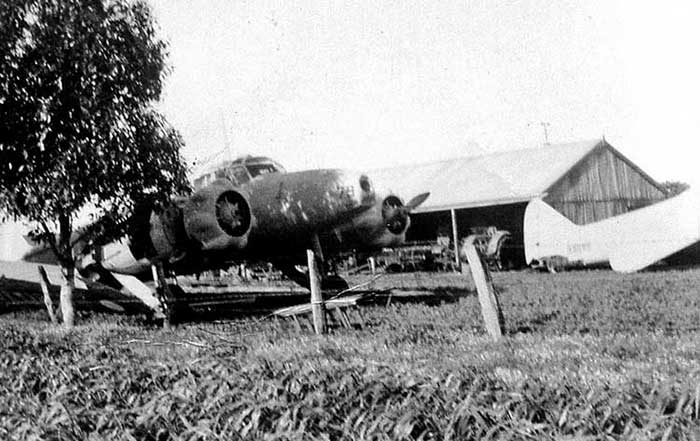 |
|||||||||||||||||||||||||||||||||||||||||||||||||||||||||||||||||||||||||||||||||
|
R3378 “79” in foreground, R9888 behind, on "Concordia" farm in 1947.
R3456 Angaston
Ex RAAF Mallala Mr. Klingbeil’s farm. Broken up for parts. A dual control column went to Mr. Lange, Angaston (see W2495) |
|||||||||||||||||||||||||||||||||||||||||||||||||||||||||||||||||||||||||||||||||
| R3537 Adelaide Ex RAAF Mallala Mr. Ross Bowley. Towed from Mallala behind his Ford Model B to a vacant block in the Adelaide suburb of Kilkenny, on the corner of Tarcowie Street and Arkaba Road. There he broke it up for its useful electrical and mechanical parts and disposed of the remainer as scrap. Yellow, nose code "54" |
|||||||||||||||||||||||||||||||||||||||||||||||||||||||||||||||||||||||||||||||||
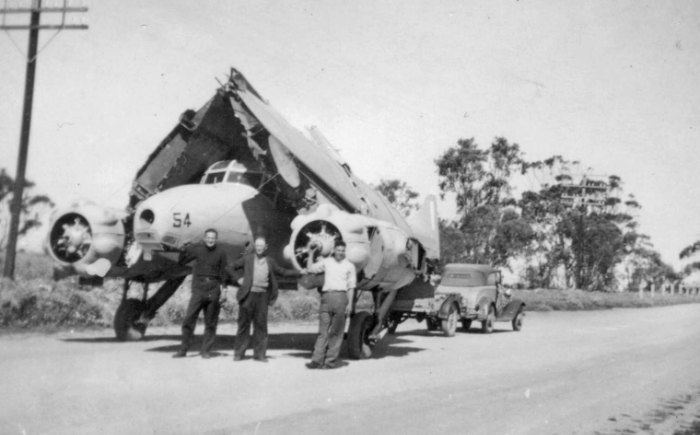 |
|||||||||||||||||||||||||||||||||||||||||||||||||||||||||||||||||||||||||||||||||
| Two photos taken during R3537's tow from RAAF Mallala to Adelaide in 1947, thanks to John Boden |
|||||||||||||||||||||||||||||||||||||||||||||||||||||||||||||||||||||||||||||||||
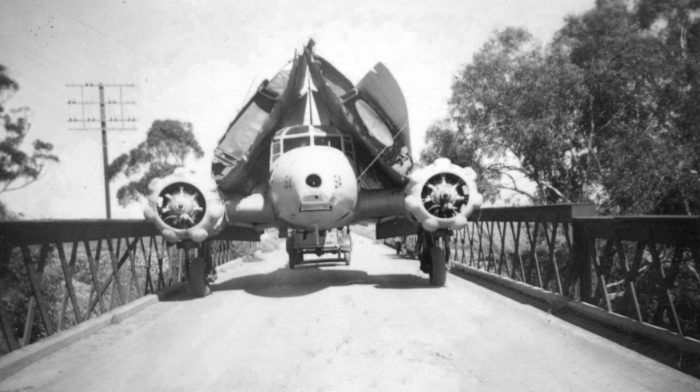 |
|||||||||||||||||||||||||||||||||||||||||||||||||||||||||||||||||||||||||||||||||
| R3560 Curramulka Ex RAAF Port Pirie Mr. S. Hayles’ farm. Yellow, nose code “86” in blue. In 1950's most of the airframe remains and the engines were sold as scrap to Jones at Port Wakefield . By mid 1980s only the nose section and scattered parts remained on the farm at Curramulka. |
|||||||||||||||||||||||||||||||||||||||||||||||||||||||||||||||||||||||||||||||||
| R9888 Gawler Ex RAAF Mallala Mr. Don Urlwin, “Concordia”, Concordia near Gawler. Towed from Mallala airfield to the farm, along with Anson R3378. In mid 1950s Mr. Urlwin moved R9888 from “Concordia” to his house in 8th Street, Gawler In late 1950s R9888 was moved again, to a property at Hiller Road, Angle Vale Early 1960s scrapped at Angle Vale Yellow, nose code “18” |
|||||||||||||||||||||||||||||||||||||||||||||||||||||||||||||||||||||||||||||||||
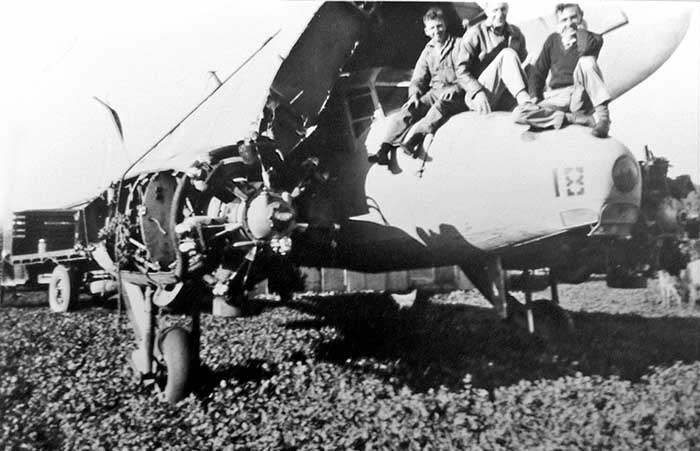 |
|||||||||||||||||||||||||||||||||||||||||||||||||||||||||||||||||||||||||||||||||
| R9888 code "18" being towed from RAAF Mallala in 1947 with outer wings lashed on board. Photo: John Boden collection |
|||||||||||||||||||||||||||||||||||||||||||||||||||||||||||||||||||||||||||||||||
| W1529 Yorketown Ex RAAF Mallala Mr.G.P. Daniell’s farm on Port Giles road, Coobowie. He also purchased Anson K8713 and the two were moved by road from Mallala together: K8713 was loaded on a lorry and nose section cut off to reduce length. The nose was on a towed trailer behind, on which W1529's tail was attached so it could be towed backwards on its main wheels. Yellow, fuselage and nose code “85" |
|||||||||||||||||||||||||||||||||||||||||||||||||||||||||||||||||||||||||||||||||
 |
|||||||||||||||||||||||||||||||||||||||||||||||||||||||||||||||||||||||||||||||||
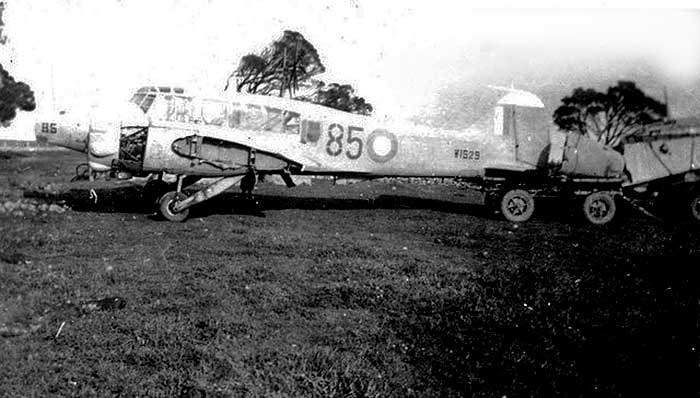 |
|||||||||||||||||||||||||||||||||||||||||||||||||||||||||||||||||||||||||||||||||
|
The top two views show W1529 arriving at Mr. Daniell's farm at Cabowie in 1947 from Mallala, towed behind Anson K8713.
Photographs courtesy Janette Smith via John Deckert
|
|||||||||||||||||||||||||||||||||||||||||||||||||||||||||||||||||||||||||||||||||
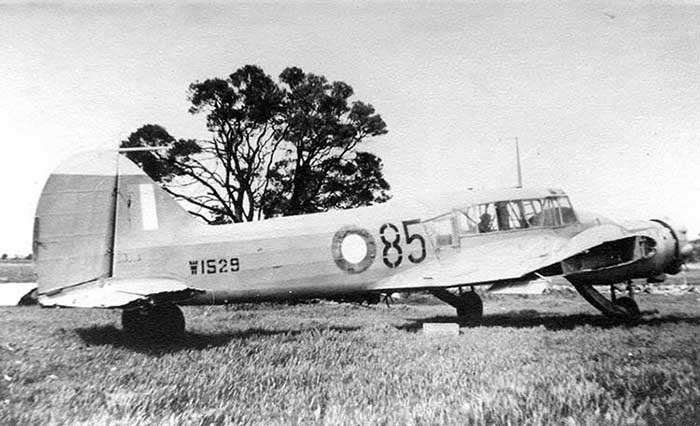 |
|||||||||||||||||||||||||||||||||||||||||||||||||||||||||||||||||||||||||||||||||
| W1529 code "85"at Caboowie near Yorketown, soon after arrival from Mallala. The light coloured band painted across the top of the tailplane indicated various 6SFTS Flights at Mallala. Photo: G.P.Daniell via David Vincent |
|||||||||||||||||||||||||||||||||||||||||||||||||||||||||||||||||||||||||||||||||
| W1537 Mount Pleasant Ex RAAF Mallala Mr. B. R. Fromm’s farm. He towed W1537 & W2524 to his farm, parked side by side. Yellow over camouflage, nose code “8-“ By 1966 complete fuselage frame, standing on undercarriage with some fuselage fittings intact. By 1974 just a bare fuselage frame. |
|||||||||||||||||||||||||||||||||||||||||||||||||||||||||||||||||||||||||||||||||
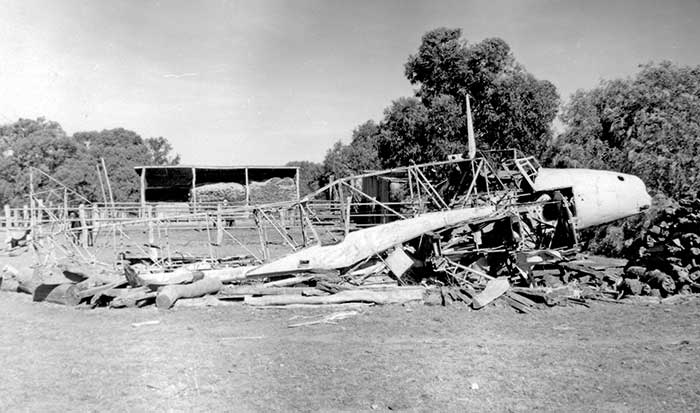 |
|||||||||||||||||||||||||||||||||||||||||||||||||||||||||||||||||||||||||||||||||
| W1537
on Mr. Fromm's farm at Mount Pleasant in June
1966.
Photo by Geoff Goodall |
|||||||||||||||||||||||||||||||||||||||||||||||||||||||||||||||||||||||||||||||||
| W1538 Kapunda Ex RAAF Mallala Mr. Kalleske’s orchard, between Kapunda and Greenock Yellow over metallic, nose code “60”. By 1966 only the fuselage frame had been broken into sections and the nose was battered - some parts were later collected by John Boden, Salisbury, Adelaide. Sections of its fin framework were used in his restoration of A4-37. |
|||||||||||||||||||||||||||||||||||||||||||||||||||||||||||||||||||||||||||||||||
| W1663 Booleroo Centre Ex RAAF Mallala Mr. Eric Toop’s farm, Morchard via Booleroo Centre. He purchased MG308 from Arthur Sawley at Bute soon after the sales. While towing MG308 from Bute, he was stopped on the road by a farmer who asked if he wanted another Anson on a property on the outskirts of Bute. He agreed and later returned to collect it. Yellow over camouflage, nose code “307”. By 1966 both Ansons had been reduced to fuselages laying on the ground, W1663 was overhanging a creek bed on the property. Fuselage W1663 sold at a farm clearance sale to Mr. P. McCritchie, Wilmington. |
|||||||||||||||||||||||||||||||||||||||||||||||||||||||||||||||||||||||||||||||||
| W1941 Alford Ex RAAF Port Pirie Bevan Heinrich, Alford: towed to his farm by Arthur Sawley of Bute, who had purchased 6 Ansons himself and had devised an effective towing method. Later W1941 was acquired from Heinrich by Mr. Len N. Betterman at Kadina and moved to his house in the town. Betterman cut up the tubular fuselage frame to construct a single seat low wing fighter plaything for his children, with a cowled Cheetah as the mock engine. He also acquired Anson parts from DJ173 (Haldanes, Bute) and MG873 (Dennis, Bute) for the project, as well as wooden outer Oxford wings from AS378 (Fuss, Agery). When his house was visited in 1966, the yellow remains of W1941 were broken up in a pile. The childrens' play aircraft was standing on its wheels but at that time without engine or wings. Much later, this "fighter" frame gained a new life when it was used as the basis for a fighter replica constructed by Newton Aircraft Co in South Australia. It was fitted with an Armstrong Siddeley Cheetah radial with "helmet" cowlings from Len Betterman's Anson parts collection. The fighter was completed for display by RAAF No.92 Wing, painted in WWII Pacific theatre RAAF markings with Len Betterman's initials as the squadron code. Mr. Betterman donated the finished fighter to the Kadina branch of the RSL (Returned and Services League of Austraia) circa 2005. It is still displayed outside the Kadina RSL branch on the Kadina-Wallaroo road. |
|||||||||||||||||||||||||||||||||||||||||||||||||||||||||||||||||||||||||||||||||
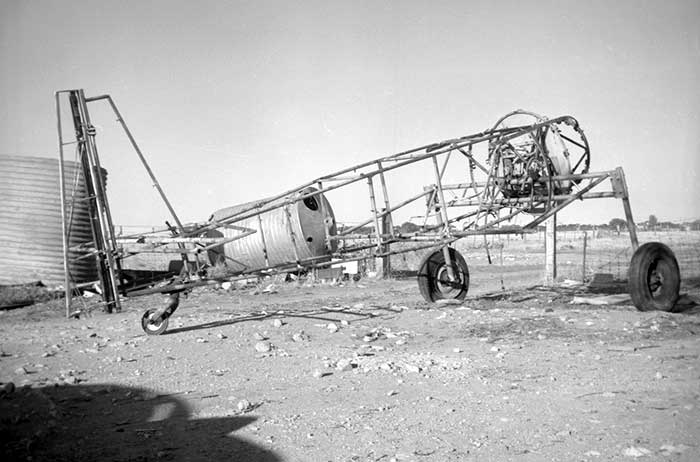 |
|||||||||||||||||||||||||||||||||||||||||||||||||||||||||||||||||||||||||||||||||
| The fuselage tubular frame of Anson W1941 was used to build this childrens' play aeroplane: Kadina SA, June 1966. Photo by Geoff Goodall |
|||||||||||||||||||||||||||||||||||||||||||||||||||||||||||||||||||||||||||||||||
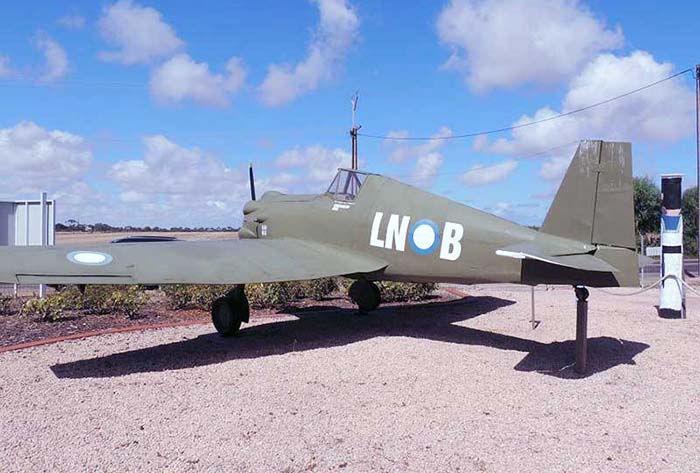 W1941's frame was the basis for this fighter replica, seen displayed at the Kadina RSL branch in February 2016.
Photo courtesy David Reid W1953 Brinkworth
Ex RAAF Port Pirie Mr. Eric Pese’ farm. He wired up his farmhouse completely with electrical wiring from the aircraft, also using the fuses and switches. Jungle green camouflage, yellow nose code “53”, with yellow “Fenton’s Flying Freighters” By 1965 parked in the duck run on its undercarriage in better condition than most farm Ansons, engines had dropped but were still cowled. One cowling section was marked W2589. |
|||||||||||||||||||||||||||||||||||||||||||||||||||||||||||||||||||||||||||||||||
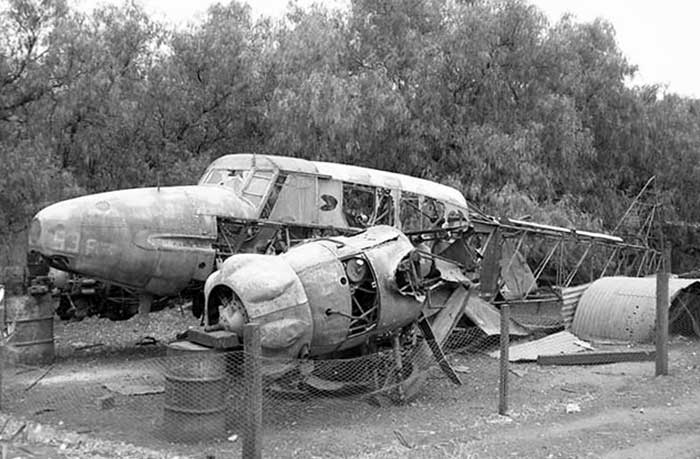 |
|||||||||||||||||||||||||||||||||||||||||||||||||||||||||||||||||||||||||||||||||
| Green camouflaged W1953 in January 1966. Common to many Ansons found in farms in the 1960s, the engines have dropped due to deterioration of the wooden wingspar to which they are attached. Photos by Geoff Goodall |
|||||||||||||||||||||||||||||||||||||||||||||||||||||||||||||||||||||||||||||||||
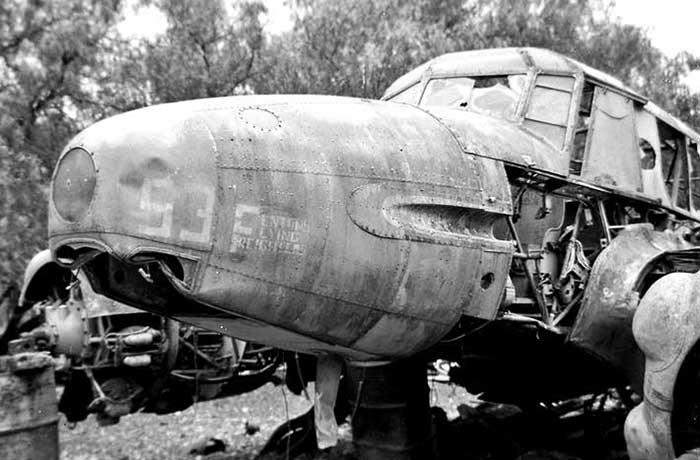 |
|||||||||||||||||||||||||||||||||||||||||||||||||||||||||||||||||||||||||||||||||
| W1953's nose has code “53” and “Fentons Flying Freighters” from its days with No.6 Communications Unit at Darwin, whose CO was pre-war Northern Territory flying doctor Dr. Clyde Fenton. |
|||||||||||||||||||||||||||||||||||||||||||||||||||||||||||||||||||||||||||||||||
| W2157 Keynton Ex RAAF Mallala Mr. Don Mitchell, “Carlyle” farm, Keynton via Angaston. Original purchaser at Mallala was Mr. Richardson, “Milton Park” Angaston. Sold to Mr. Mitchell for £1 at a farm clearance dale around 1955. By 1966 only the yellow cockpit and nose section was found on Mr.Mitchell’s farm, while on the nearby "Milton Park" farm where it originally resided, many parts were located. By 1974 cockpit and nose section and one engine with engine mounts remained at "Carlyle" farm. |
|||||||||||||||||||||||||||||||||||||||||||||||||||||||||||||||||||||||||||||||||
| W2434 Sedan Ex RAAF Mallala Wally Rosenzweig’s farm at Towitta via Sedan. Yellow. - collected 1.7.84 from this farm by Bob Jarrett of SA Aviation & Warbird Restoration Group. Moved to a BP garage at Salisbury North, Adelaide for storage: with Ansons VH-FIA and EF954. - W2434’s remains in poor condition. In 1986 John Boden hoped to acquire them. - by 1987 W2434 reported at RAAF Point Cook museum |
|||||||||||||||||||||||||||||||||||||||||||||||||||||||||||||||||||||||||||||||||
| W2495 Angaston Ex RAAF Mallala Mr. L. Lange’s orchard. He purchased it in 1949 from a yard next to the Angaston garage. By 1980s sections of fuselage frame, engine nacelles and parts in a shed on his farm |
|||||||||||||||||||||||||||||||||||||||||||||||||||||||||||||||||||||||||||||||||
| W2501 Ardrossan Ex RAAF Port Pirie Mr. Colin Lodge’s farm. Yellow. Cheetah cowlings sections marked AW451, DJ504 & A4-21 also on site. By 1966 had been completely broken up, with parts found scattered across the property. By 1974 nothing was left. |
|||||||||||||||||||||||||||||||||||||||||||||||||||||||||||||||||||||||||||||||||
| W2524 Sedan Ex RAAF Mallala Stiller Motors, in town of Sedan. Original purchaser was Mr. B. R. Fromm, Mount Pleasant. He towed W1537 & W2524 to his farm, parked side by side. W2524 was towed away c1948 by the owner of Stiller Motors, who broke it up to make a caravan out of the fuselage frame and wheels. By 1966 just yellow parts and framework were found at the back of the motor garage By 1974 only engine mounts and parts left |
|||||||||||||||||||||||||||||||||||||||||||||||||||||||||||||||||||||||||||||||||
| W2589 Ardrossan Ex RAAF Port Pirie Mr. A. R. Vandepeer’s farm, Petersville via Ardrossan W2589 was taxied around the paddocks of the farm, with the Cheetah engines being gravity fed from a can of petrol. By 1966 W2589 & AX267 were beside each other on the farm near the house, W2589 standing on its undercarriage although both engines had dropped. Yellow, nose code “89” - nose section was removed by Lincoln Nitschke in April 1980 and moved to Adelaide as part of his collection of aircraft and components - forward fuselage of W2589 arrived Parafield, stored in fenced compound behind DAP hangar, with fuselage AX350 - By 1987 forward fuselage at Nitschke’s Military & Historical Aircraft Collection, Greenock. - By 2016 W2589's nose section from cockpit forward has been restored and is displayed at Nitschke's Military & Historical Aircraft Collection at Greenock in the Barossa Valley SA. |
|||||||||||||||||||||||||||||||||||||||||||||||||||||||||||||||||||||||||||||||||
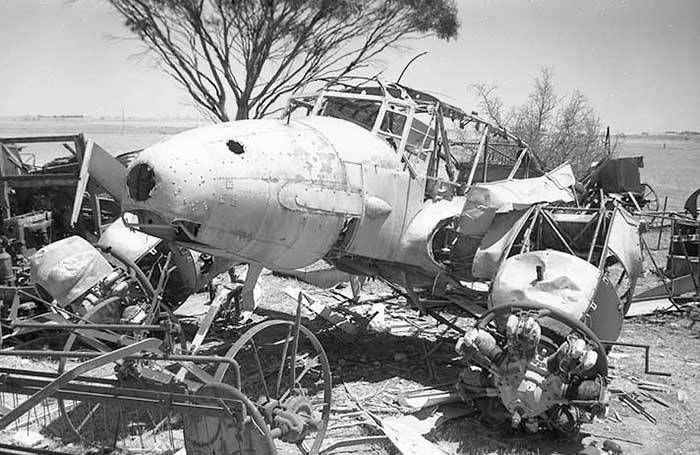 |
|||||||||||||||||||||||||||||||||||||||||||||||||||||||||||||||||||||||||||||||||
| W2589 in RAAF trainer yellow,
on a farm near Ardrossan, January
1966.
Photo by Geoff Goodall |
|||||||||||||||||||||||||||||||||||||||||||||||||||||||||||||||||||||||||||||||||
| W2267 Nuriootpa Ex RAAF Mallala Mr. Zimmerman’s orchard near Nuriootpa. Yellow, nose code “8”. An engine and nacelle was sold to Henry Wendt (see N4918 & AX147) By early 1980s only small pieces remained at Zimmerman’s property including a hinge for wing landing lights. Ansons prior to R9… series had nose lights, and the starter magneto ignition in the engine at Wendt’s farm restricted the identity to early W… series. W2267 sold from Mallala is a likely candidate, but unconfirmed. |
|||||||||||||||||||||||||||||||||||||||||||||||||||||||||||||||||||||||||||||||||
| AW484 Mount Rat Ex RAAF Port Pirie Mr. Wakefield’s farm. He purchased the farm from Mr. Mahar in the 1950s, Mahar had towed the aircraft from Port Pirie in 1947. Locals say it was towed on roads with outer wings attached. Yellow By 1966 was a stripped fuselage frame on belly in high grass. |
|||||||||||||||||||||||||||||||||||||||||||||||||||||||||||||||||||||||||||||||||
| AW666 Wokurna Ex RAAF Port Pirie Mr. D. Dolling’s farm. By 1980s only airframe sections and cowlings remained, heaped together. |
|||||||||||||||||||||||||||||||||||||||||||||||||||||||||||||||||||||||||||||||||
| AW796 Maitland Ex RAAF Port Pirie Mr. Whitelaw’s farm Yellow, nose code “796” By mid 1980s only a few parts remained |
|||||||||||||||||||||||||||||||||||||||||||||||||||||||||||||||||||||||||||||||||
| AX147 Greenock Ex RAAF Mallala Mr. Henry Wendt’s farm. He also had a second Anson from Mallala, probably N4918 AX147 was acquired by Maurice Hempel and moved to his house in Angaston. Yellow By 1966 bare fuselage frame and cowlings ina yard in the towen of Angaston. By 1974 only two engine mounts and undercarriage parts remained |
|||||||||||||||||||||||||||||||||||||||||||||||||||||||||||||||||||||||||||||||||
| AX262 Port Pirie Ex RAAF Port Pirie Mr. J. Vonow’s piggery. By 1966 broken up and fire damaged. A second Anson nearby was completely burnt out. |
|||||||||||||||||||||||||||||||||||||||||||||||||||||||||||||||||||||||||||||||||
| AX267 Ardrossan Ex RAAF Port Pirie Mr. A. R. Vandepeer’s farm, Petersville via Ardrossan. He purchased W2589 & AX267 By 1965 W2589 & AX267 stood beside each other near the farmhouse Brown and green camouflage on metal, nose code “67”. Wartime nose art could still be seen on either side of the nose, a yellow bird clutching a bomb in its claws, set in a blue circle. By 1966 was a wrecked forward fuselage section, laying on its belly. |
|||||||||||||||||||||||||||||||||||||||||||||||||||||||||||||||||||||||||||||||||
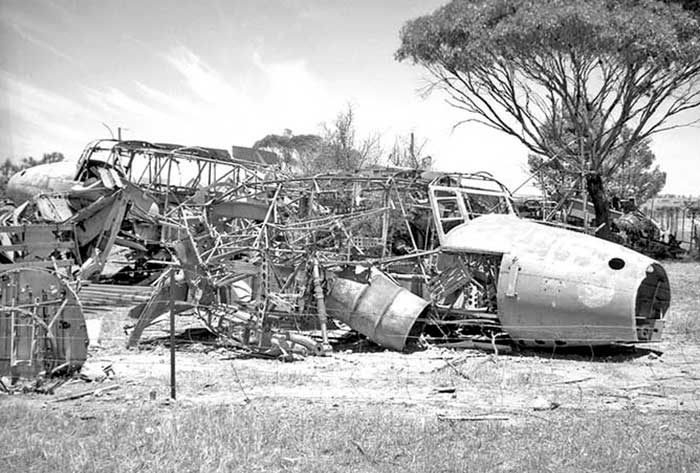 |
|||||||||||||||||||||||||||||||||||||||||||||||||||||||||||||||||||||||||||||||||
| Forward
fuselage of AX267 on a farm at Ardrossan January 1966, W2589
behind.
Photos by Geoff Goodall |
|||||||||||||||||||||||||||||||||||||||||||||||||||||||||||||||||||||||||||||||||
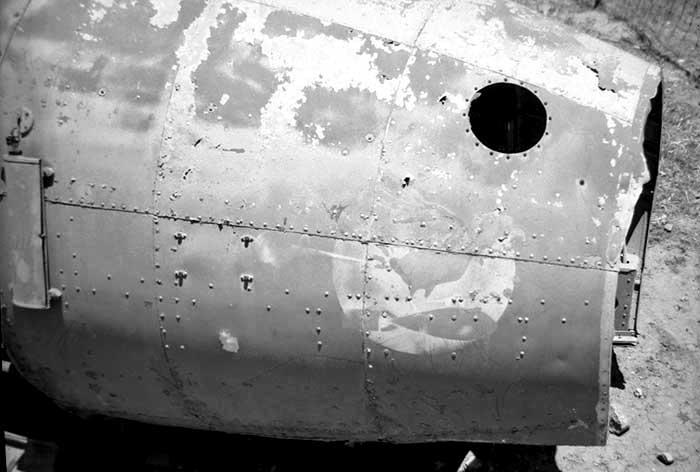 |
|||||||||||||||||||||||||||||||||||||||||||||||||||||||||||||||||||||||||||||||||
| Nose art was rare on RAAF Ansons. AX267 featured a yellow bird with bomb inside a blue circle. |
|||||||||||||||||||||||||||||||||||||||||||||||||||||||||||||||||||||||||||||||||
| AX280 Port Pirie Ex RAAF Port Pirie Mr. F. Martin’s farm, three miles from Port Pirie airfield. Mr. Martin towed his Anson across the airfield with wings attached and through the perimeter fence to the Hannan brothers' property. He removed the outer wings at the Hannan’s, then towed the aircraft backwards to his own farm. Yellow over camouflage, nose code “280” with Wing Commander’s pennant painted on nose, triangular flag in white, blue and red. By 1966 complete fuselage frame standing near farm house. Scrapped in 1970. |
|||||||||||||||||||||||||||||||||||||||||||||||||||||||||||||||||||||||||||||||||
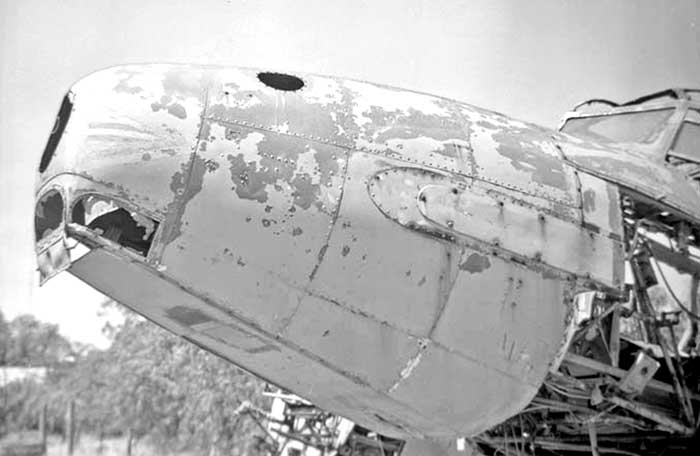 |
|||||||||||||||||||||||||||||||||||||||||||||||||||||||||||||||||||||||||||||||||
|
AX280's nose in February 1966 on a Port Pirie farm, yellow over camouflage.
The faded paintwork of the Wing Commander's penant can still be seen. Photo by Geoff Goodall |
|||||||||||||||||||||||||||||||||||||||||||||||||||||||||||||||||||||||||||||||||
| AX350 Owen Ex RAAF Mallala Mr. Tiller’s farm Yellow, nose code “61”. By 1966 was complete fuselage frame, standing on its undercarriage. - John Boden, Salisbury, Adelaide salvaged two Cheetah engines and wheels of AX350 - 1.3.80 collected from the farm by Lincoln Nitschke and moved by road to Parafield Airport, Adelaide. stored initially in Robbys Aircraft hangar, where Nitschke works as an ground engineer. - 1.4.80 AX350 fuselage seen stored in Robbys hangar at Parafield - later stored in fenced compound behind DAP hangars with other aircraft parts collected by Nitschke, He has formed a small group planning to establish an aviation museum. - 12.4.80 nose section of W2589 (Ardrossan) arrived at the compound - 8.5.80 dismantled DH.104 Devon VH-CJX moved into the compound - 5.80 Cheetah engine from MG992 (Bute) moved into the compound - 5.80 two Cheetah engines from Oxford HN657 (Sandilands) moved into the compound - 22.5.80 an unidentified aircraft gun turret was collected from Ajax Motor Wreckers, Port Wakefield Road and moved into the Nitschke compound at Parafield - By 87 AX350 at Nitschke’s Military & Historical Aircraft Collection, Greenock: fuselage frame has been sand-blasted and painted. - By 2016 AX350 was the most complete of three Ansons at Nitschke’s Military & Historical Aircraft Collection, Greenock: fuselage has been restored and is standing on its undercarriage, attached to a new-build centre-section. |
|||||||||||||||||||||||||||||||||||||||||||||||||||||||||||||||||||||||||||||||||
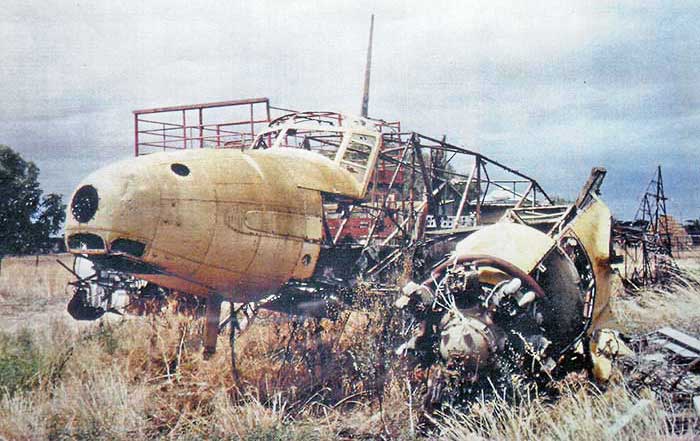 |
|||||||||||||||||||||||||||||||||||||||||||||||||||||||||||||||||||||||||||||||||
| AX350
at Owen in the 1970s still in RAAF trainer yellow.
Photo by John Boden |
|||||||||||||||||||||||||||||||||||||||||||||||||||||||||||||||||||||||||||||||||
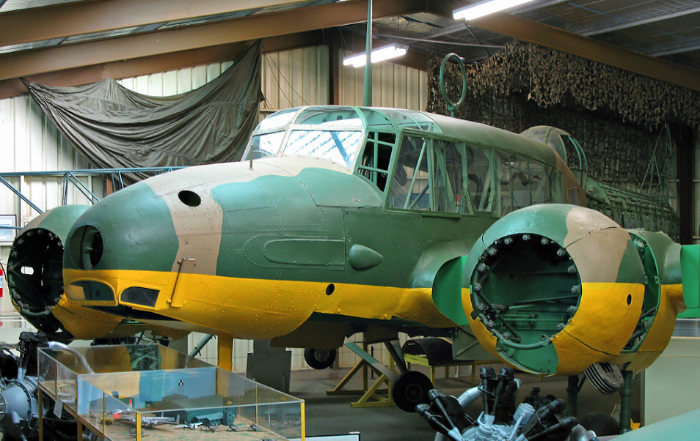 |
|||||||||||||||||||||||||||||||||||||||||||||||||||||||||||||||||||||||||||||||||
| Lincoln Nitschke's excellent restoration of AX350 in his aircraft collection at Greenoch SA |
|||||||||||||||||||||||||||||||||||||||||||||||||||||||||||||||||||||||||||||||||
| DG728 Sandilands Ex RAAF Port Pirie Mr. Anderson’s farm. Anderson died in 1970 and property purchased by Mr. J. H. Craig, who sold the remains of DG728 in his farm clearing sale. It was removed by Mr. Baker of Maitland. Brown and green camouflage on metal with yellow undersides meeting the camouflage in a wavy line along the bottom of the fuselage sides, nose code “28”. By 1980s remains found at Maitland in chopped up condition, largely burnt out. Scrapped 1986. |
|||||||||||||||||||||||||||||||||||||||||||||||||||||||||||||||||||||||||||||||||
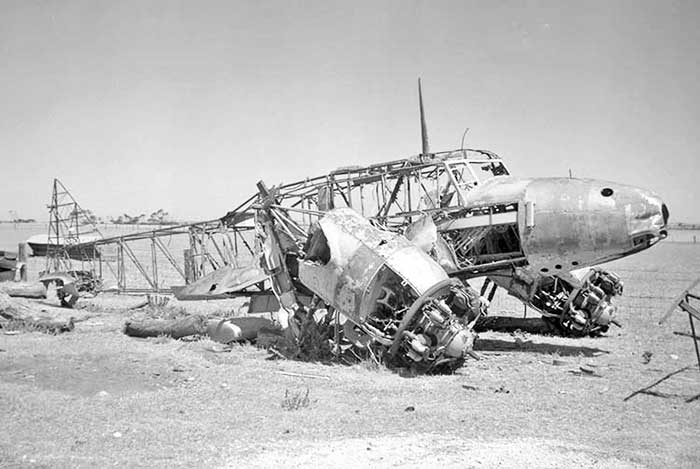 |
|||||||||||||||||||||||||||||||||||||||||||||||||||||||||||||||||||||||||||||||||
| Camouflaged
DG728 at Sandilands, January
1966.
Photo by Geoff Goodall |
|||||||||||||||||||||||||||||||||||||||||||||||||||||||||||||||||||||||||||||||||
| DG753 Owen Ex RAAF Mallala Mr. Clem Bird, Bird’s Motors in the town. Stripped for nuts, bolts, wiring for car repairs Yellow By 1966 only the cowlings remained, in the chicken run at his house in town |
|||||||||||||||||||||||||||||||||||||||||||||||||||||||||||||||||||||||||||||||||
| DG824 Nuriootpa Ex RAAF Port Pirie Mr. G. Ahrens’ orchard. Originally towed from Port Pirie sales by Mr. Thamm of Angaston. It was parked on the outskirts of the town until moved to Mr. Ahrens’ farm near Nuriootpa Yellow By 1966 the stripped fuselage was on its side. Also on the property were two Cheetah engines, one each from Oxfords X6842 and EB838 purchased at farm clearance sales of the Barker brothers’ farms at Wasleys. By July 1967 DG824's fuselage frame was identified in Hines Metals Ltd yard at Wingfield, Adelaide. Also there was frame of MG161 from Bute and the remains of an Oxford. |
|||||||||||||||||||||||||||||||||||||||||||||||||||||||||||||||||||||||||||||||||
| DJ173 Bute Ex RAAF Port Pirie Mr.Max Haldane’s farm. Purchased as playhouse for children. Parked near the farm house without outer wings. Remained reasonably complete until early 1960s when it had fallen into disapidated state and was broken up. The fuselage was dragged backwards to a dry creek bed on the property, during which the nose section dug in, tearing apart the metal skinning. The fuselage was dumped at the creek bed. Yellow. By 1965 the fuselage frame on belly with nose wrecked. No sign of wooden wing centre section or engines. All remains of this aircraft were carted away after a farm clearing sale in late 1960s. |
|||||||||||||||||||||||||||||||||||||||||||||||||||||||||||||||||||||||||||||||||
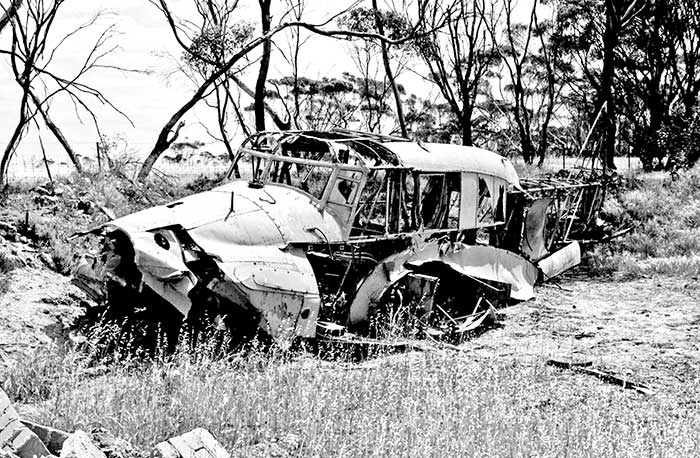 |
|||||||||||||||||||||||||||||||||||||||||||||||||||||||||||||||||||||||||||||||||
| DJ173's
battered fuselage dumped in trees on the Haldane property at Bute SA in
1965. Photo
by Arthur Perkins |
|||||||||||||||||||||||||||||||||||||||||||||||||||||||||||||||||||||||||||||||||
| DJ288 Gulnare Ex RAAF Port Pirie Clifford E. Thomas’ farm Yellow By 1966 only the burnt-out fuselage frame, The nose had been used to build a hot rod, engines sold. |
|||||||||||||||||||||||||||||||||||||||||||||||||||||||||||||||||||||||||||||||||
| DJ507 Waikerie Ex RAAF Mallala Mr. Jack Andrews’ fruit orchard. To remove it from RAAF Mallala within the 10 days limit given to purchasers, it was towed the short distance to Mr. Davies’ farm (A4-23) where stayed until collected by Mr. Andrews. He towed it backwards behind a truck to Waikerie. Crossed the River Murray on the Blanchtown punt, when a tyre blew out when it snagged a spike on the punt deck. A rough patch was put on tyre and tube and after some hours he towed it off the punt. Yellow over camouflage, nose code “5”. By 1966 only forward fuselage and engines with propellers attached, laying on the ground. |
|||||||||||||||||||||||||||||||||||||||||||||||||||||||||||||||||||||||||||||||||
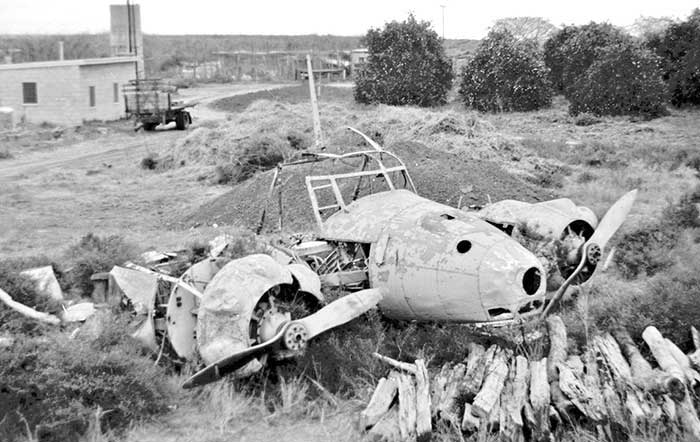 |
|||||||||||||||||||||||||||||||||||||||||||||||||||||||||||||||||||||||||||||||||
| The yellow remains of DJ507 in an orchard near Waikerie in October 1966. The rear fuselage had been cut up. Photo by Geoff Goodall |
|||||||||||||||||||||||||||||||||||||||||||||||||||||||||||||||||||||||||||||||||
| DJ508 Clare Ex RAAF Port Pirie Mr. W. Hawker, “Calcannia”, Clare Yellow over camouflage, nose code “88” Mr. Hawker also purchased Anson MG142 at the same sale. By 1966 the remains of both Ansons were still on “Calcannia”, close to each other. Both had been broken up for parts, leaving only forward fuselage with nose. Parts put to many uses on the property. |
|||||||||||||||||||||||||||||||||||||||||||||||||||||||||||||||||||||||||||||||||
| EF954 Mallala Ex RAAF Mallala Reg Frank’s farm near the town. Yellow, nose code “40” Photographed here 20.9.53 by John Smith. The complete fuselage with port engine removed was standing on its gear, fabric and panels had been torn away by weather. Rear fuselage framework exposed due fabric gone, but the cabin Perspex windows were still in place. The two wings outboard of the engines were in a shed on the farm until 1959 when sold to the Clare Soaring Club who wanted the wood to use for glider construction. - By 1965 unmoved but now a bare fuselage frame, starboard engine had dropped. Windscreen wiper gear remained intact. - In 1984 donated "as is" by Reg Franks to SA Aviation and Warbird Restoration Group, Adelaide - 11.6.84 collected from farm by group members, moved by road to museum premises at Adelaide suburb Glenelg, where restoration began. Components were supplied by dismantled Anson VH-FIA which the group purchased from Moorabbin Air Museum and moved by road from Melbourne to Glenelg in April 1985. - 16.11.86 EF954 project displayed at RAAF Edinburgh airshow - group changed name to SA Historical Aviation Museum in September 1986. - By 1987 EF954’s fuselage frame had been sand-blasted, painted and new timber work added, standing on its undercarriage with Cheetah engines with props reinstalled; - SA Historical Aviation Museum established a site in Port Adelaide to display its aircraft and engines collection, but the Anson restoration project remained at Glenelg. - The Port Adelaide site was closed and the group's collection of aircraft and engines dispersed. Group leader Bob Jarrett moved to a hangar at Parafield Airport to establish Classic Jets Fighter Museum. - EF954 incorporating parts of VH-FIA was acquired by a newly-formed South Australian Aviation Museum at a different larger site at Port Adelaide with a purpose-designed building. There its restoration to display standard with a new-build wooden wing continues. |
|||||||||||||||||||||||||||||||||||||||||||||||||||||||||||||||||||||||||||||||||
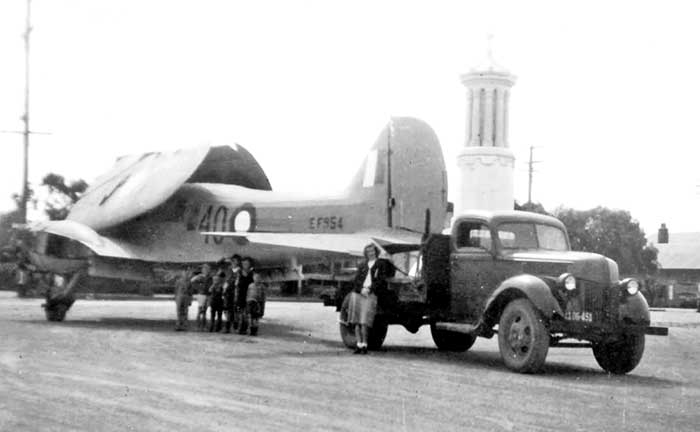 |
|||||||||||||||||||||||||||||||||||||||||||||||||||||||||||||||||||||||||||||||||
| EF954 coded "40" in Mallala town main street during the tow to Reg Franks' farm in 1947. Photo: Reg Franks via SA Aviation Museum |
|||||||||||||||||||||||||||||||||||||||||||||||||||||||||||||||||||||||||||||||||
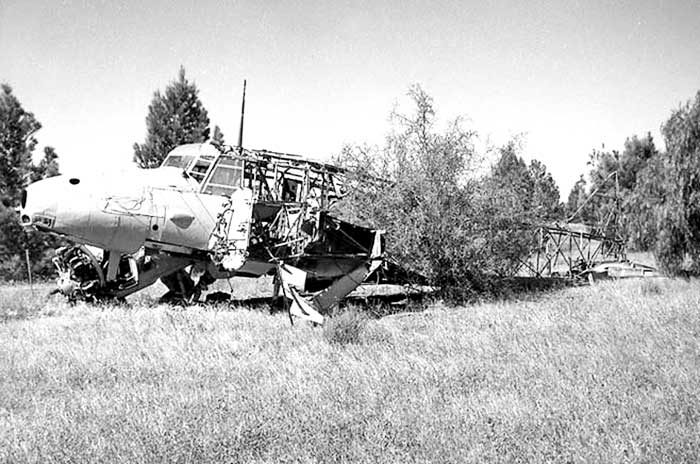 |
|||||||||||||||||||||||||||||||||||||||||||||||||||||||||||||||||||||||||||||||||
| EF954 near Mallala in February
1965, with a tree growing through the fuselage
frame. Photo by Geoff Goodall |
|||||||||||||||||||||||||||||||||||||||||||||||||||||||||||||||||||||||||||||||||
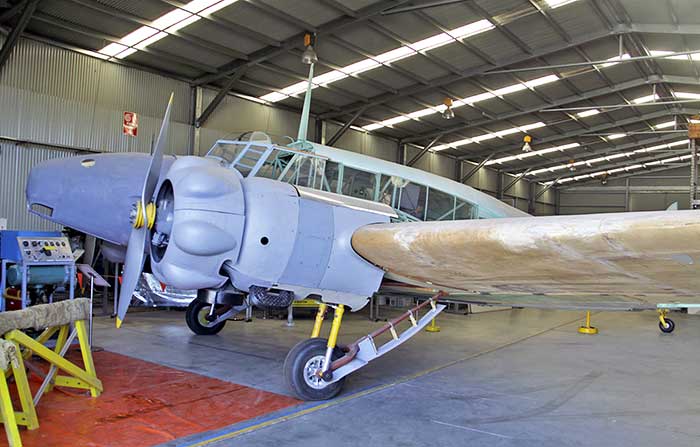 |
|||||||||||||||||||||||||||||||||||||||||||||||||||||||||||||||||||||||||||||||||
| EF954
under restoration at SA Aviation Museum, Port Adelaide in May
2015.
Photo by Nigel Daw |
|||||||||||||||||||||||||||||||||||||||||||||||||||||||||||||||||||||||||||||||||
| EG535 Appila Ex RAAF Port Pirie Mr. Albert Pech’s farm. He purchased two Ansons, EG535 & MG190 and towed them to his farm. The property was sold to Mr. Harvey in 1962 and MG190 was left there. During 1952 Albert Pech moved to a property at Taplin in the far east of SA near the Vic/NSW border and towed EG535 behind a truck to the new farm. It had one engine removed and must have been in a deteriorated condition after 15 years in the weather. However in 1966 at Mr. Harvey’s farm at its original location, EG535’s port side rear fuselage yellow fabric was found in a disused barn: it had the painted serial EG535 with code “A” in black next to the blue-white Pacific theatre roundel. - this fabric section was saved by John Smith, Adelaide. - by 2016 Mr.Thomas Laucke at Cambrai SA has the fuselage frames of MG897 and MG521 as a restoration project. He also has remains from EG535 and MG392 for parts. |
|||||||||||||||||||||||||||||||||||||||||||||||||||||||||||||||||||||||||||||||||
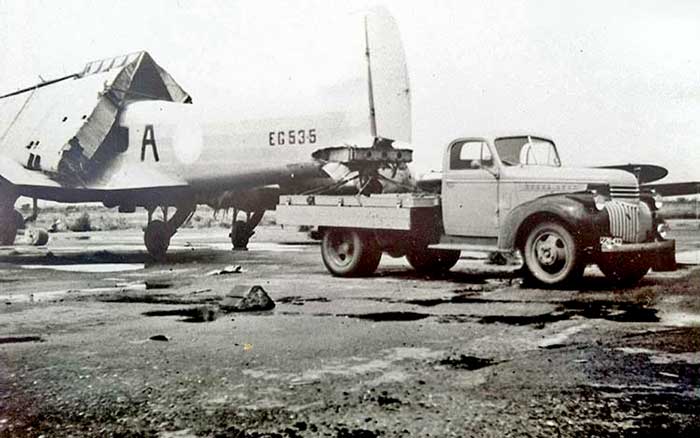 |
|||||||||||||||||||||||||||||||||||||||||||||||||||||||||||||||||||||||||||||||||
| EG535
leaves RAAF Port Pirie towed behind Albert Pech’s truck in
1947.
Photos via John Boden |
|||||||||||||||||||||||||||||||||||||||||||||||||||||||||||||||||||||||||||||||||
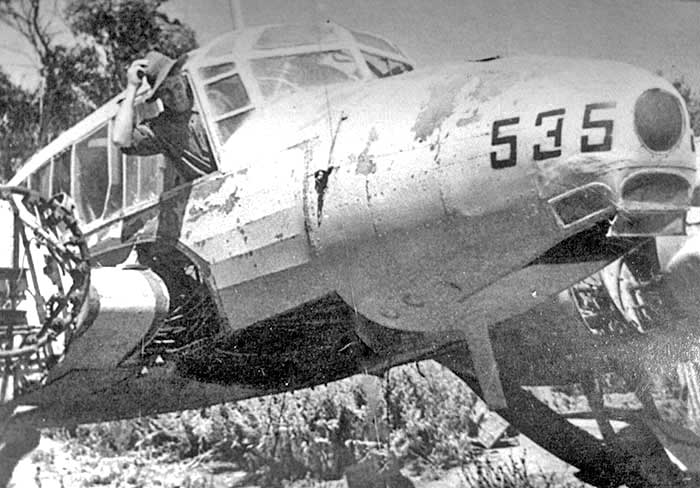 |
|||||||||||||||||||||||||||||||||||||||||||||||||||||||||||||||||||||||||||||||||
| "G'Day". Albert Pech at home on his farm at Appila with EG535 |
|||||||||||||||||||||||||||||||||||||||||||||||||||||||||||||||||||||||||||||||||
| LT708 Red Banks Ex RAAF Mallala Mr. Ross Verner’s farm, 10 miles from Mallala. He also towed home Oxford X6966. Jungle green camouflage, nose code “78” in yellow. By 1966 LT708 was standing on its undercarriage. The turret housing was intact with machine gun supports. The derelict remains of Oxford X6966 were alongside. By 1985 condition of both aircraft was mostly unchanged. After Ross Verner’s death in 2010, his sons cleared the property and sold the aircraft as scrap. |
|||||||||||||||||||||||||||||||||||||||||||||||||||||||||||||||||||||||||||||||||
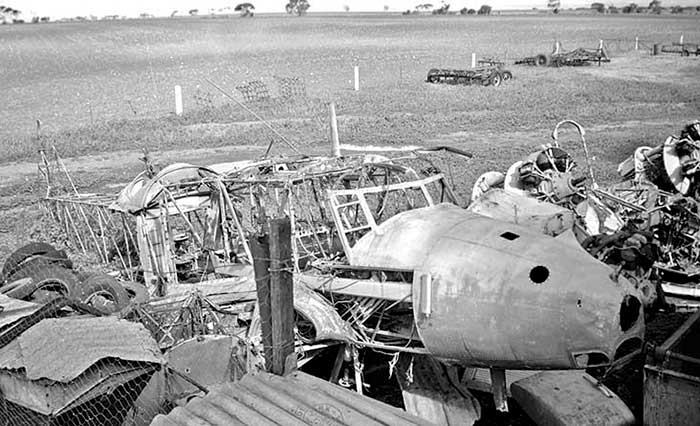 |
|||||||||||||||||||||||||||||||||||||||||||||||||||||||||||||||||||||||||||||||||
|
LT708 at Red Banks in August 1966, showing turret housing and machine gun support.
On the right is Oxford X6966 in ruins. Photo by Geoff Goodall |
|||||||||||||||||||||||||||||||||||||||||||||||||||||||||||||||||||||||||||||||||
| LV130 Minlaton Ex RAAF Port Pirie Mr. L. Murdoch’s farm. He had kept the sales receipt from Port Pirie. By 1980s only a section of rear fuselage frame remained. |
|||||||||||||||||||||||||||||||||||||||||||||||||||||||||||||||||||||||||||||||||
| LV131 Snowtown Ex RAAF Port Pirie Mr. Max Atkinson’s farm. Original purhaser was Mr. Tom Slattery. Yellow, nose code “131”. It was fitted with a turret. By 1974 the forward fuselage, engine mounts and one Cheetah remained. |
|||||||||||||||||||||||||||||||||||||||||||||||||||||||||||||||||||||||||||||||||
| LV203 Snowtown Ex RAAF Port Pirie Mr. Murray Read’s farm Originally one of 6 Ansons purchased from Port Pirie by Arthur Sawley, all towed to his property “Devon Downs” near Bute. LV203 was later purchased by Murray Read and moved to Snowtown. Yellow, fuselage code “C”, nose code “203” By 1974 the property was owned by Mr. J.L. McNamara. Only a few scattered bits remained. |
|||||||||||||||||||||||||||||||||||||||||||||||||||||||||||||||||||||||||||||||||
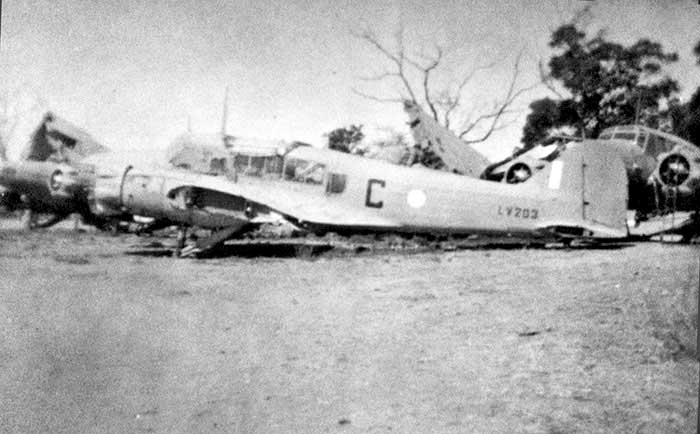 |
|||||||||||||||||||||||||||||||||||||||||||||||||||||||||||||||||||||||||||||||||
| LV203 “C” at “Devon Downs” Bute in 1947, one of six Ansons towed to this farm by Arthur Sawley. Photo: John Boden collection |
|||||||||||||||||||||||||||||||||||||||||||||||||||||||||||||||||||||||||||||||||
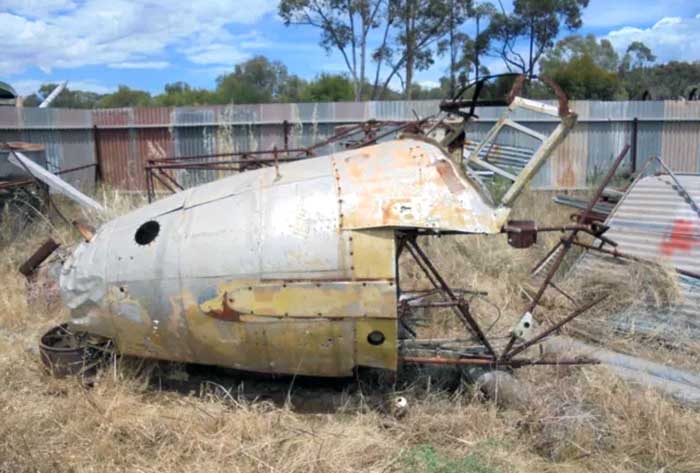 |
|||||||||||||||||||||||||||||||||||||||||||||||||||||||||||||||||||||||||||||||||
| By 2020 all that remained of the Arthur Sawley Anson collection was LV203's nose section held by John Boden. Photo by John Boden |
|||||||||||||||||||||||||||||||||||||||||||||||||||||||||||||||||||||||||||||||||
| LV204 Warooka Ex RAAF Port Pirie Mr. Max Koennecke, “Rocklyn Park" farm. In 1947 5 Ansons (LV204, MG178, MG795, MG972, MH122) were towed in convoy from Port Pirie sale to Warooka by local farmers. All five were towed down the main street of Warooka on arrival. Yellow over camouflage, nose code “04”. By 1966 fuselage frame on belly, engines nearby. One propeller donated to Nigel Daw, Adelaide Both engines of LV204 later acquired by Mr. Wilson, Crystal Brook (MG897) |
|||||||||||||||||||||||||||||||||||||||||||||||||||||||||||||||||||||||||||||||||
| LV212 Mount Gambier Ex RAAF Mount Gambier At a house in the town, became derelict in the weather. Remaining Anson components collected by Don McBain and moved to his airfield at Nelson Vic where he operates an aircraft maintenance business, specialising in vintage aircraft. Some metal panels were cut into numerous circular disks, purpose unknown. Remaining sections of LV212 were collected by the Nhill Aviation Heritage Centre group to provide parts for their restoration of MG122 - see below |
|||||||||||||||||||||||||||||||||||||||||||||||||||||||||||||||||||||||||||||||||
| LV264 Adelaide Ex RAAF Port Pirie Mr. N. Paton’s orchard, 1 Dashwood Road, Beaumont in the Adelaide suburbs. He had towed it backwards behind his blitz jeep from Port Pirie to Adelaide, with the plan to use the fuselage frame to construct a one-man caravan. It was not done because of damage from souvenir hunters tearing off parts. Yellow By 1966 only the forward fuselage and engines remained, in the orchard next to beehives. In 1974 Paton sold the land for sub-division. He assumed the Anson remains would be soon removed. |
|||||||||||||||||||||||||||||||||||||||||||||||||||||||||||||||||||||||||||||||||
| LV294 Jamestown Ex RAAF Port Pirie Mr. W. Bailey’s farm By 1980s scattered sections were dumped in a dry creek bed on the property. |
|||||||||||||||||||||||||||||||||||||||||||||||||||||||||||||||||||||||||||||||||
| LV296 Gulnare Ex RAAF Port Pirie Mr. Prest’s farm. Yellow By 1966 completely broken up, only parts remained. The rear fuselage frame was located in the town at the Gulnare Lawn Bowling Club where it was used as a step ladder to reach spot lights. By 1980s only parts found at Mr. Prest’s farm, including engine cowlings In 1990s the Bodens examined the cowlings in the chicken house and found them painted with LV296 |
|||||||||||||||||||||||||||||||||||||||||||||||||||||||||||||||||||||||||||||||||
| MG122 Tantanoola Ex RAAF Mount Gambier Mr. Jack Sinclair, Fourth Street, Tantanoola SA. Purchased 24.8.47 by Jack Sinclair at a disposals auction sale at the former RAAF station on Mount Gambier Aerodrome. Towed on its undercarriage to his house in Tantanoola. All yellow, nose code "22" Inspected in 1974, by which time the fuselage, one engine and many parts were still at the Sinclair house. Engine cowling sections were hand-painted on the inside "122" and "727". During the 1980s an Anson restoration group was formed at Mount Gambier SA by Frank Hart and Murray Davis. The intention was to rebuild an Anson for display at the airport to recognise its role as a RAAF station during WWII. Parts were collected from the remains of Ansons on farms in the district and MG122's fuselage frame was moved to a building at the airport to be the basis of the rebuild. The project proved beyond the group's means and the fuselage fame and parts were left under cover at the airport for many years. In 2009 most of the remaining sections of MG122 were collected by volunteers from the Nhill Aviation Heritage Centre at Nhill Vic, to be used in the restoration of their Anson W2364. One Cheetah engine from MG122 is displayed in the foyer of the Mount Gambier Airport passenger terminal, while the other engine is now displayed at Nhill. (W2364 had been auctioned in 1953 at Ballarat RAAF Station where it was used by RAAF Air Ground Radio School. It was transported to a farm near Warracknabeal Vic. Located circa 2007 by the foundation members of the Nhill Aviation Heritage Centre, and moved to Nhill for restoration, which is at an advanced stage by 2018) |
|||||||||||||||||||||||||||||||||||||||||||||||||||||||||||||||||||||||||||||||||
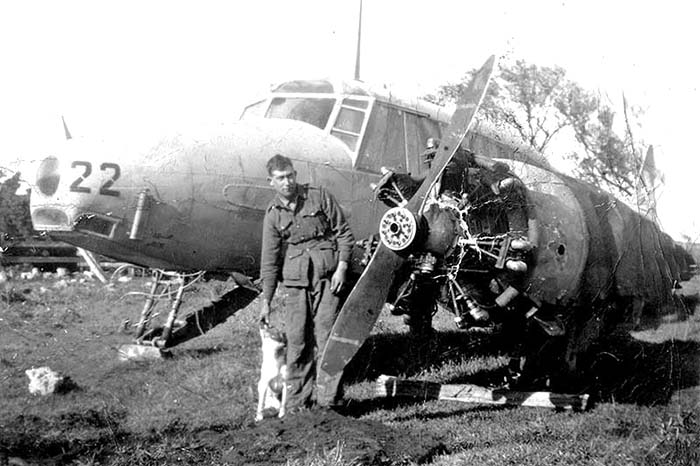 |
|||||||||||||||||||||||||||||||||||||||||||||||||||||||||||||||||||||||||||||||||
| MG122 at Tantanoola circa 1948, with Jack Sinclair and his trusty dog. Photo via Mike Kingwell |
|||||||||||||||||||||||||||||||||||||||||||||||||||||||||||||||||||||||||||||||||
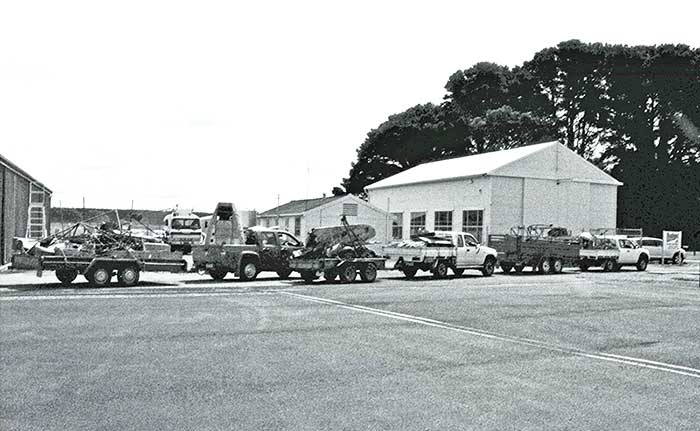 |
|||||||||||||||||||||||||||||||||||||||||||||||||||||||||||||||||||||||||||||||||
| The impressive volunteer convoy at Mount Gambier Airport SA in 2009, moving sections of MG122 to Nhill to assist the restoration of Nhill Aviation Heritage Centre's Anson W2364. Photo: Mike Kingwell |
|||||||||||||||||||||||||||||||||||||||||||||||||||||||||||||||||||||||||||||||||
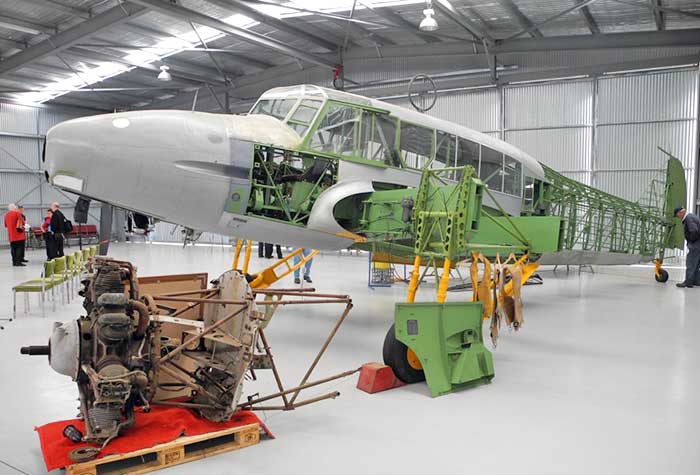 |
|||||||||||||||||||||||||||||||||||||||||||||||||||||||||||||||||||||||||||||||||
| Parts from MG122 were used in this rebuild of W2364 at Nhill Vic, seen in May 2014. Photo by Kevin O'Reilly |
|||||||||||||||||||||||||||||||||||||||||||||||||||||||||||||||||||||||||||||||||
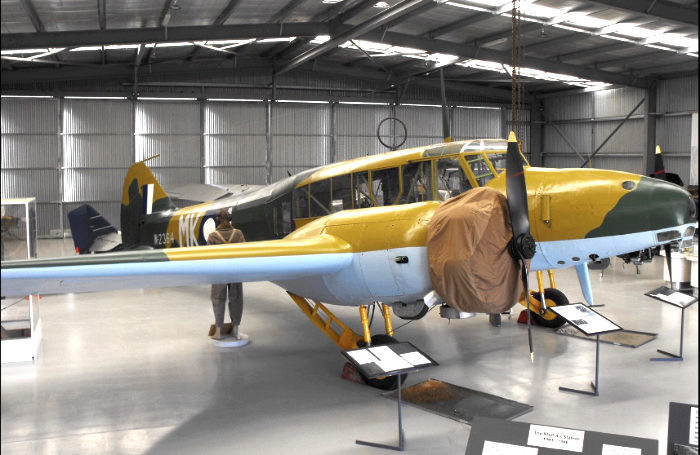 |
|||||||||||||||||||||||||||||||||||||||||||||||||||||||||||||||||||||||||||||||||
| Superb completed Anson W2364 at the Nhill Aviation Heritage Centre at Nhill Airport June 2020. Photo John Boden |
|||||||||||||||||||||||||||||||||||||||||||||||||||||||||||||||||||||||||||||||||
| MG142 Clare Ex RAAF Port Pirie Mr. W. Hawker, “Calcannia” farm, Clare Yellow over camouflage, nose code “142”. Mr. Hawker also purchased Anson DJ508 at the same sale. By 1966 the remains of both Ansons were still on “Calcannia”, close to each other. Both had been broken up for parts, leaving only forward fuselage with nose. Full circular sets of cowlings had been made into horse water troughs. |
|||||||||||||||||||||||||||||||||||||||||||||||||||||||||||||||||||||||||||||||||
| MG161 Bute Ex RAAF Port Pirie Mr. Keith Crosby’s farm Yellow. By 1966 was stripped in poor condition When Mr. Crosby sold the property in 1967, the Anson was disposed of as scrap metal by the new owner. - by July 1967 fuselage frame MG161 was identified in Hines Metals Ltd yard at Wingfield, Adelaide. Also there was DG824. |
|||||||||||||||||||||||||||||||||||||||||||||||||||||||||||||||||||||||||||||||||
| MG172 Punthari Ex RAAF Mallala Mr. Eric Falkenberg’s farm Yellow over camouflage, nose code “47” - By 1966 standing on its undercarriage with cowled engines. - By 1974 still standing on undercarriage, some instruments in cockpit. The elevators and rudder still covered by yellow fabric were stored in a barn. - Around 1980 Mr. Falkenburg moved the Anson to the rear of his of his property out of sight, because trespassers had stolen parts. - in 2005 Alan Newton purchased MG172 from Mr. Fakenburg's his estate. At that time it was the most intact of the few surviving Ansons on South Australian farms. estate. It was reported that Mr.Newton intended to break the airframe up for parts to be sold to various static Anson restoration projects - By 2016 MG172 had been moved to Rupanyup, Victoria where it is displayed on Ron Schneider's property with other derelict aircraft and some military vehicles. MG172 consists of the fuselage frame with nose section. |
|||||||||||||||||||||||||||||||||||||||||||||||||||||||||||||||||||||||||||||||||
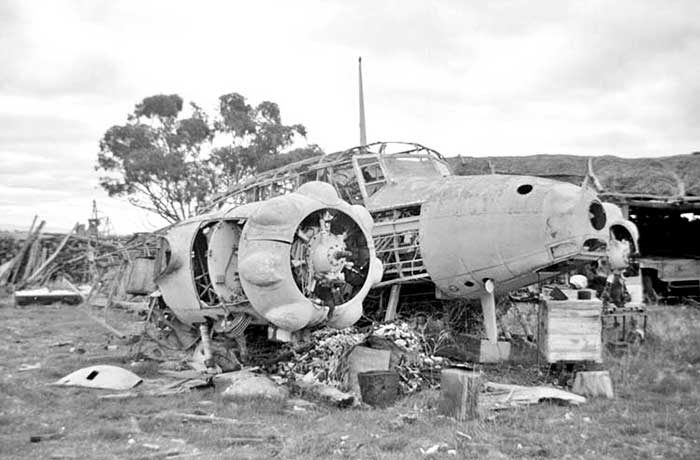 |
|||||||||||||||||||||||||||||||||||||||||||||||||||||||||||||||||||||||||||||||||
| MG172 at Punthari in August 1966. Yellow over camouflage. Unlike most farm Ansons neither Cheetah engines had dropped, breaking away from the wooden wing spar. Photo by Geoff Goodall |
|||||||||||||||||||||||||||||||||||||||||||||||||||||||||||||||||||||||||||||||||
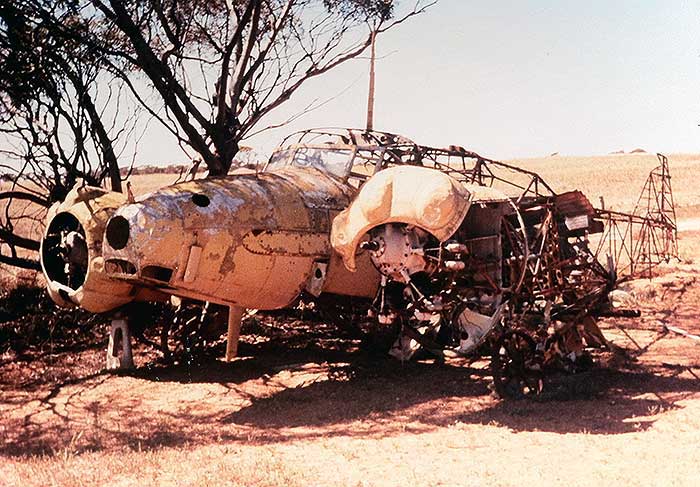 |
|||||||||||||||||||||||||||||||||||||||||||||||||||||||||||||||||||||||||||||||||
| Nearly 40 years later, on the same farm in 2005, just before it was broken up for parts. Photo by John Boden |
|||||||||||||||||||||||||||||||||||||||||||||||||||||||||||||||||||||||||||||||||
| MG178 Corny Point Ex RAAF Port Pirie Mr. Bob Rowe’s farm In 1947 5 Ansons (LV204, MG178, MG795, MG972, MH122) were towed in convoy from Port Pirie sale to Warooka by local farmers. All five were towed down the main street of Warooka in a procerssion on arrival. Yellow over camouflage, nose code “78”. By 1966 only the stripped fuselage frame remained at the farm. The cockpit and nose section was found in a childrens playground in the town of Corny Point. |
|||||||||||||||||||||||||||||||||||||||||||||||||||||||||||||||||||||||||||||||||
| MG188 Curramulka Ex RAAF Port Pirie Mr. Short’s farm By mid 1980s only a few parts remained, on an old farm rubbish heap. |
|||||||||||||||||||||||||||||||||||||||||||||||||||||||||||||||||||||||||||||||||
| MG190 Apilla Ex RAAF Port Pirie. Mr. Albert Pech’s farm. He purchased two Ansons, MG190 & EG535 and towed them to his farm. Yellow, code “U” This property was sold to Mr. Harvey in 1962 and MG190 was left there. Harvey disposed of it soon afterwards at a farm clearance sale for sixpence to the proprietor of a welding business in the nearby town of Booleroo Centre. Here its remains were found in 1966, the tubular steel fuselage frame having been cut up to provide tubing for the welding workshop |
|||||||||||||||||||||||||||||||||||||||||||||||||||||||||||||||||||||||||||||||||
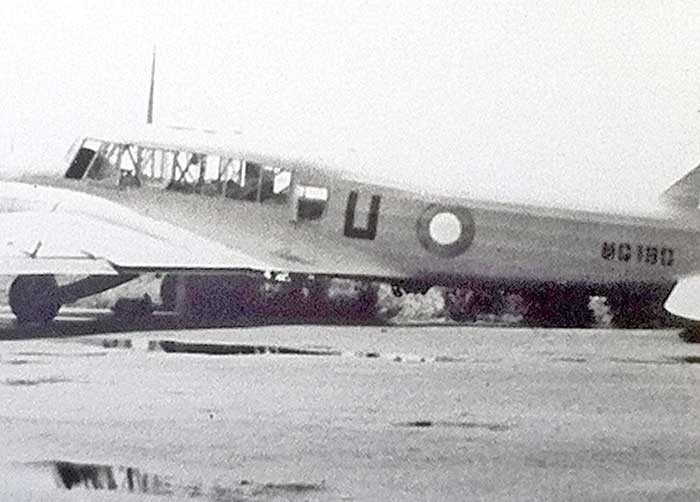 MG190 all yellow, code "U" at RAAF Port Pirie in August 1947, waiting to be towed away by Albert Pech. Photo: John Boden collection |
|||||||||||||||||||||||||||||||||||||||||||||||||||||||||||||||||||||||||||||||||
| MG191 Waikerie Ex RAAF Port Pirie Mr. Jock Barrett’s farm. He acquired it from Angaston Garage, Angaston Yellow over camouflage, nose code “191” By 1966 broken up, several cowling sections were marked MG190, which was also sold from Port Pirie By late 1970s cockpit section and engine mounts remained |
|||||||||||||||||||||||||||||||||||||||||||||||||||||||||||||||||||||||||||||||||
| MG197 Port Pirie Ex RAAF Port Pirie Mr. D Johns’ farm, Port Pirie. He moved it from another farm at Port Pirie Yellow, nose code “97” By early 1980s only the fuselage forward of the gun turret position remained. - collected by Allan Newton, Birdwood SA - sold to Sean Morgan, Monash SA: cockpit section restored - sold to Graham Field, Forbes NSW - by 2016 MG197's restored cockpit section is displayed at Bankstown Aviation Museum, Bankstown Airport, Sydney. The museum advises that they also have the remains of three Anson fuselage frames. |
|||||||||||||||||||||||||||||||||||||||||||||||||||||||||||||||||||||||||||||||||
| MG215 Adelaide Ex RAAF Port Pirie Mr. S. Hutchinson, 193 Portrush Road, Maylands in the Adelaide suburbs. Planned to be their children’s playhouse at the Adelaide home. In 1966 only a few components were located at the house at 193 Portrush Road, Maylands. While being towed from Port Pirie to Adelaide, backwards on its wheels behind the Hutchinson family car, a gust of wind near Port Wakefield caused the aircraft to swing off the road and fall over an embankment, being badly damaged. The wreck was hauled away by Mr. J. H. Forrest to his property at South Hummocks. There it was broken up for parts over the years until scrapped in the 1980s. In 1966 one Cheetah engine from MG216 was found beside a shed in the main street of Port Wakefield. |
|||||||||||||||||||||||||||||||||||||||||||||||||||||||||||||||||||||||||||||||||
| MG222 Bute Ex RAAF Port Pirie Mr. Ted Harris’ farm Yellow over camouflage, undersides were white before over-sprayed yellow, nose code “222”. When located in 1966 it was in better condition than most farm Ansons, with the engines still fully cowled and just beginning to drop due to deterioration of the wooden wing spar to which the engine mounts were attached. - In 1972 Ted Harris gave MG222 to Adelaide enthusiast John Delaney. On 5 May 1972 Delaney flew a Cessna to the farm to make a close inspection of the airframe and take measurements, to decide the best way to transport it to Adelaide. Not collected - Approx 1975 collected by Geoff Moesker, Brisbane Qld and moved by truck to Brisbane as a restoration project. - In 1977 purchased from Moesker by Queensland Air Museum, Brisbane. Initially stored with their RAAF Canberra on a block of land at Kuraby, by 1985 it had been moved inside a woolshed in the Brisbane suburb of Hendra. In May 1990 it was moved from Hendra to museum member David Bussey’s home, where restoration continues. Painted green and brown camouflage, nose code “222” in white. - By 2016 MG422's fuselage was reported by QAM as 80% restored and new-build wooden wings had begun construction, with the aim of displaying a complete Anson. |
|||||||||||||||||||||||||||||||||||||||||||||||||||||||||||||||||||||||||||||||||
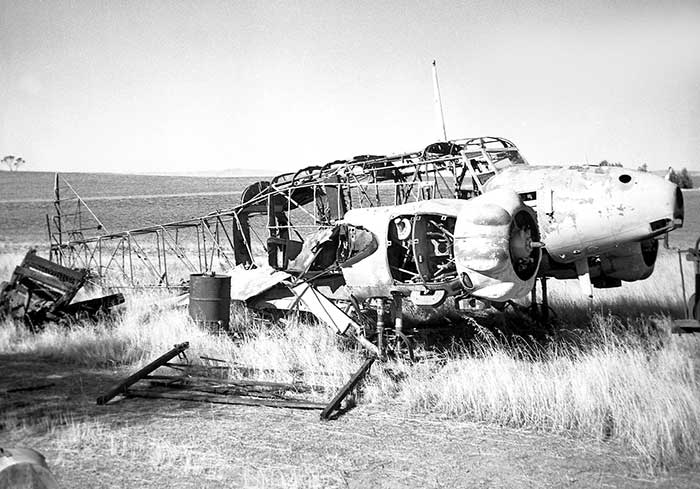 |
|||||||||||||||||||||||||||||||||||||||||||||||||||||||||||||||||||||||||||||||||
| MG222
on Ted Harris' farm at Bute in February 1966. Yellow over
camouflage.
Photo by Geoff Goodall |
|||||||||||||||||||||||||||||||||||||||||||||||||||||||||||||||||||||||||||||||||
| MG308 Booleroo Centre Ex RAAF Port Pirie Mr. Eric Toop’s farm at Morchard Originally one of 6 Ansons purchased from Port Pirie by Arthur Sawley, all towed to his property “Devon Downs” near Bute. MG308 soon resold to Mr. Toop who towed it to Booleroo Centre. He also had Anson W1663. Yellow only, no nose code readable. By 1966 both Ansons had been reduced to fuselages laying on belly near a creek bed on the property |
|||||||||||||||||||||||||||||||||||||||||||||||||||||||||||||||||||||||||||||||||
| MG346 Bute Ex RAAF Port Pirie Mr. I. A. M. Sawley’s farm “Devon Downs”. Arthur Sawley purchased 6 Ansons, planning to scrap them for their aluminium. MG346 was later sold to Eric Mildwaters of Kadina who took some sections to Kadina. Yellow, nose code “346” By 1966 MG346 was a burnt out fuselage frame and engines. Another burnt out Anson was nearby. Parts marked MG346 were found in the town of Kadina at the same time. |
|||||||||||||||||||||||||||||||||||||||||||||||||||||||||||||||||||||||||||||||||
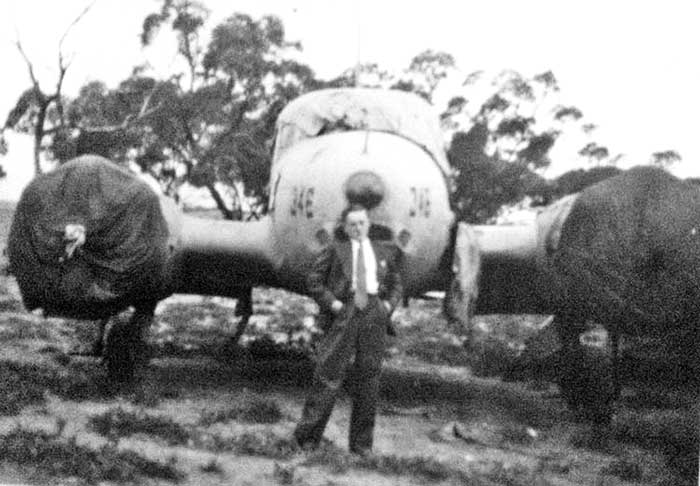 |
|||||||||||||||||||||||||||||||||||||||||||||||||||||||||||||||||||||||||||||||||
| The entrepreneurial Arthur Sawley poses with Anson MG346 code "346" in his collection of six Ansons at Devon Downs, Bute SA. Photo: John Boden collection
|
|||||||||||||||||||||||||||||||||||||||||||||||||||||||||||||||||||||||||||||||||
| MG388 Bute Ex RAAF Port Pirie Mr. G. Cowley’s farm. He purchased the aircraft mainly for its undercarriage legs. Remainder of the aircraft later moved to Mr. M. Beare’s farm near Kadina, where it was broken up. By 1980s all that remained at Beare’s property was the forward fuselage |
|||||||||||||||||||||||||||||||||||||||||||||||||||||||||||||||||||||||||||||||||
| MG390 Jamestown Ex RAAF Port Pirie Mr. Hoffman, “Mount Carmel” Station, Jamestown This Anson had been sold by Commonwealth Disposals Commission at RAAF Port Pirie prior to the “aircraft remnants” sale. On 13 May 1947 it was sold to Sgt. R. A. Reimers, Port Pirie West SA for £25, the low price indicating that it was not valued as a potential civil aircraft. It was issued to the purchaser on 6 June 1947. Either MG390 was not moved off the RAAF station, and was included in the subsequent DAP sale in October 1947, or Mr. Hoffman acquired MG390 from Sgt. Reimers. Yellow, ADF loop in teardrop housing on roof behind radio mast. - On 20 August 1983 removed by Lincoln Nitschke and moved by road to Parafield Airport, Adelaide as part of his collection of aircraft and components, which included sections of Ansons AX350 & W2589. Stored at Parafield in a fenced compound with - By 1987 MG390’s fuselage at Nitschke’s Military & Historical Aircraft Collection, Greenock. - By 2016 MG390 is displayed at at Nitschke’s Military & Historical Aircraft Collection, Greenock as a restored fuselage. |
|||||||||||||||||||||||||||||||||||||||||||||||||||||||||||||||||||||||||||||||||
| MG391 Port Broughton Ex RAAF Port Pirie Mr. Pattingdale’s farm. Yellow, nose code “391” By 1980s property was abandoned: battered forward fuselage standing on undercarriage. By 1990 the fuselage had been burnt out by a scrub fire. |
|||||||||||||||||||||||||||||||||||||||||||||||||||||||||||||||||||||||||||||||||
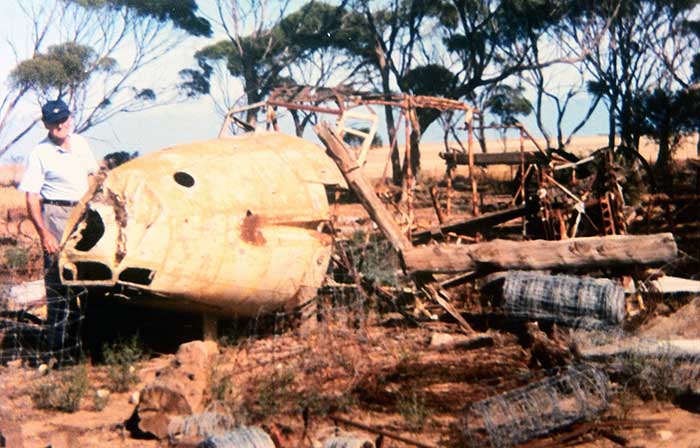 |
|||||||||||||||||||||||||||||||||||||||||||||||||||||||||||||||||||||||||||||||||
| The sad end of MG391 in 1990, after being burnt out by a scrub fire. Dedicated Anson hunter John Boden (Senior) is standing by the nose. John, with his son John, combed SA Anson remains searching for parts they needed to restore a complete Anson fuselage with genuine components: see A4-37. Photo by John Boden (Junior) |
|||||||||||||||||||||||||||||||||||||||||||||||||||||||||||||||||||||||||||||||||
| MG392 Gladstone Ex RAAF Port Pirie Mr. Growden, “Springdale” Station, Gladstone. Purchased to provide wheels to use to move a large RAAF shed also purchased by Mr.Growden at the Port Pirie sales. The Anson was towed to the farm behind his truck, where wheels were removed to take back to Port Pirie. By 1966 the Anson was still standing on its undercarriage (less wheels) with most wooden decking still on the fuselage frame, both engines removed. The wings were laying on the ground nearby and were yellow. Camouflage over yellow, nose code “392”. In 1966 also located on this property were: - parts of Ansons MG190 and LV281, picked up when MG392 was collected - cowlings and undercarriage legs of Oxfords LW968 & HN634 collected from RAAF dump at Port Pirie during the war - fuselage centre-section up to firewall of a Fairey Battle, also from RAAF dump Port Pirie during the war. The RAAF airfield dump backed on to a beach and parts were souvenired by locals when fishing on the beach. By 2016 Mr. Thomas Laucke at Cambrai SA has the fuselage frames of MG897 and MG521 as a restoration project. He also has remains from EG535 and MG392 for parts. |
|||||||||||||||||||||||||||||||||||||||||||||||||||||||||||||||||||||||||||||||||
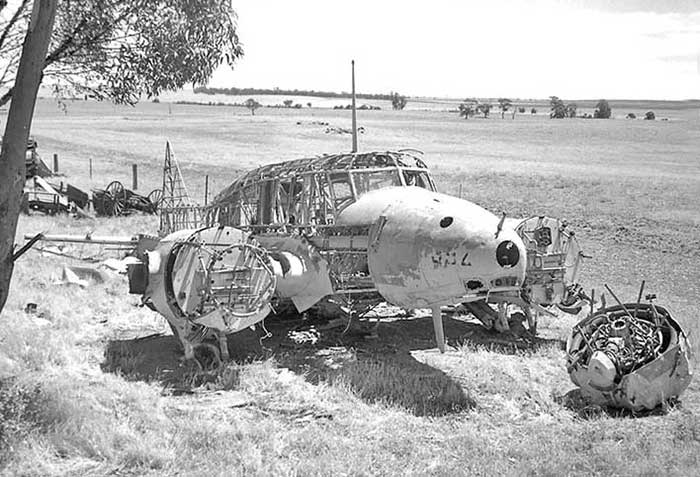 |
|||||||||||||||||||||||||||||||||||||||||||||||||||||||||||||||||||||||||||||||||
| Camouflaged
MG392 code "392" at Gladstone SA in May
1966.
Photo by Geoff Goodall |
|||||||||||||||||||||||||||||||||||||||||||||||||||||||||||||||||||||||||||||||||
| MG453 Paskeville Ex RAAF Port Pirie Mr. George Shearer, Shearer’s Garage in the town of Paskeville. Purchased for parts Yellow. Large ADF loop on roof behind radio mast By 1966 only a collection of frame and parts remained, behind the Goodyear Depot in main street. In 1974 it was cleared away as scrap. |
|||||||||||||||||||||||||||||||||||||||||||||||||||||||||||||||||||||||||||||||||
| MG521 Clare Ex RAAF Port Pirie Farm at Manora via Clare Yellow, nose code “521” By 1980s complete fuselage frame standing on its undercarriage. - collected by Thomas Laucke, Cambrai SA as restoration project: he also had MG987. - by 2016 Mr.Laucke still has the fuselage frames of MG521 and MG897 as an ongoing restoration project. He also has remains of EG535 and MG392 for parts. |
|||||||||||||||||||||||||||||||||||||||||||||||||||||||||||||||||||||||||||||||||
| MG522 Winulta Ex RAAF Port Pirie Mr. J. V. Kenny’s farm, Winulta Yellow, nose code “522”. By 1966 only the forward fuselage frame remained. By 1974 the remains were on the farm rubbish dump. By late 1970s the property was owned by Mr.Osters. Forward fuselage and engine mounts remained. |
|||||||||||||||||||||||||||||||||||||||||||||||||||||||||||||||||||||||||||||||||
| MG526 Arthurton Ex RAAF Port Pirie Mr. Dean Allen’s farm at Winulta, via Arthurton. He had purchased two Ansons from Port Pirie, the second unidentified Yellow. By 1966 only the forward fuselage section remained, on its belly in a rubbish tip at the back of the property with old farm vehicles. By late 1970s the property was owned by Mr. Graham. All Anson parts had been sold for scrap. |
|||||||||||||||||||||||||||||||||||||||||||||||||||||||||||||||||||||||||||||||||
| MG735 Port Pirie Ex RAAF Port Pirie Mr. V. Hannan’s farm, brother of Mr.Hannan (MG757), who had neighbouring properties on the boundary of Port Pirie airfield. MG735 & MG757 were purchased by the Hannan brothers, who towed them backwards with wings attached across the airfield to the perimeter fence, which they had temporarily dismantled to let the aircraft through. Yellow over camouflage, nose code “735”. By 1966 it was a complete fuselage frame standing on its undercarriage. - donated circa 1980 to Port Pirie Council for planned restoration to be displayed at the airport to recognise its role as a RAAF station during WWII. Moved from the farm to Port Pirie Airport by November 1982 when MG735 was sitting on its undercarriage legs on the former RAAF hard standing area. Some restoration commenced, but the project was abandoned. - by 1987 had been donated to Bob Jarrett of the SA Aviation Museum. Cut up for parts. |
|||||||||||||||||||||||||||||||||||||||||||||||||||||||||||||||||||||||||||||||||
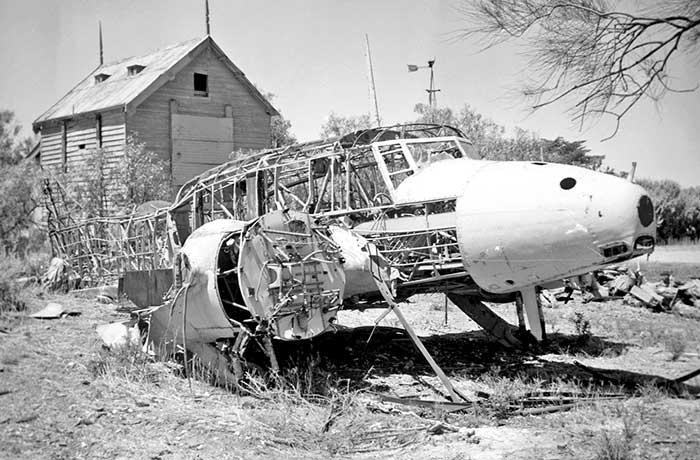 |
|||||||||||||||||||||||||||||||||||||||||||||||||||||||||||||||||||||||||||||||||
| MG735
code "735" yellow over camouflage, on a farm near Port Pirie in
February 1966. Photo by Geoff
Goodall |
|||||||||||||||||||||||||||||||||||||||||||||||||||||||||||||||||||||||||||||||||
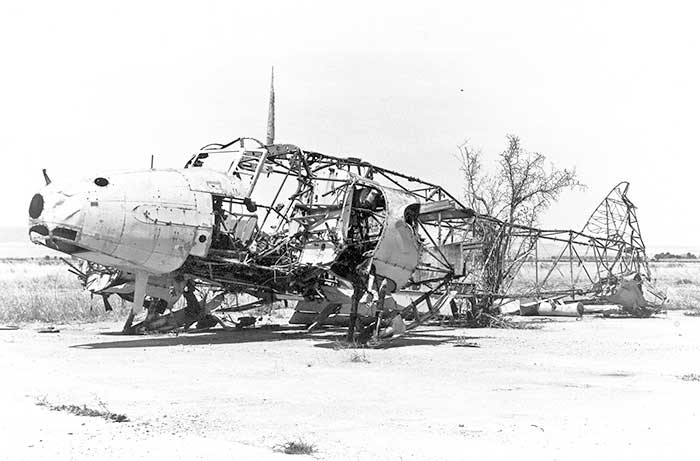 |
|||||||||||||||||||||||||||||||||||||||||||||||||||||||||||||||||||||||||||||||||
| November 1982, MG735 at Port Pirie Airport for an optimistic restoration project that was never completed. Photo by David Vincent |
|||||||||||||||||||||||||||||||||||||||||||||||||||||||||||||||||||||||||||||||||
| MG757 Port Pirie Ex RAAF Port Pirie Mr. Hannan’s farm. Brother of Mr. V. Hannan (MG735), who had neighbouring properties on the boundary of Port Pirie airfield. MG735 & MG757 were purchased by the Hannan brothers, who towed them backwards with wings attached across the airfield to the perimeter fence, which they had temporarily dismantled to let the aircraft through. Yellow over camouflage, nose code “757”. By 1966 standing on its undercarriage, with rear fuselage frame removed, no wings. By late 1970s the centre section with forward fuselage and engine mounts had been moved to the farm rubbish dump. Also in the rubbish were found remains of 4 other Ansons and a Tiger Moth. |
|||||||||||||||||||||||||||||||||||||||||||||||||||||||||||||||||||||||||||||||||
| MG775 Port Broughton Ex RAAF Port Pirie Mr. Claude Tannock’s farm, Port Broughton Yellow, code “81” Originally one of 6 Ansons purchased from Port Pirie by Arthur Sawley, all towed to his property “Devon Downs” near Bute. MG775 later sold to Mr. Thancock and moved to Port Broughton - in 1984 fuselage centre-section was collected from farm at Port Broughton by Bob Jarrett/SA Aviation Museum, Adelaide |
|||||||||||||||||||||||||||||||||||||||||||||||||||||||||||||||||||||||||||||||||
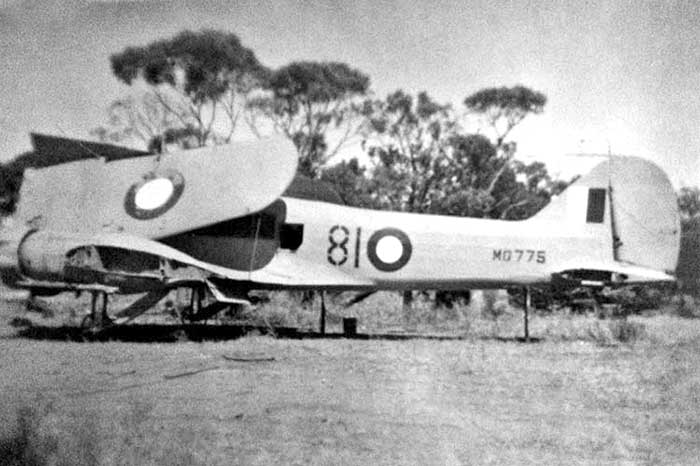 |
|||||||||||||||||||||||||||||||||||||||||||||||||||||||||||||||||||||||||||||||||
| Yellow
MG775 “81” at “Devon Downs”, Bute 1947, outer wings lashed to the
sides.
Photo via John Boden |
|||||||||||||||||||||||||||||||||||||||||||||||||||||||||||||||||||||||||||||||||
| MG778 Bute Ex RAAF Port Pirie Mr. I. A. M. Sawley’s farm “Devon Downs”. Arthur Sawley purchased 6 Ansons, planning to scrap them for their aluminium. Later sold this Anson to Lloyd Cowley. Yellow, nose code “75” - in 10.80 forward fuselage frame, nose code “75” collected by John Boden and moved to his house at 14 Hooper Street, Salisbury North, Adelaide. |
|||||||||||||||||||||||||||||||||||||||||||||||||||||||||||||||||||||||||||||||||
| MG795 Yorketown Ex RAAF Port Pirie Mr. Brundell’s farm, Yorketown. In 1947 5 Ansons (LV204, MG178, MG795, MG972, MH122) were towed in convoy from Port Pirie sale to Warooka by local farmers. All five were towed down the main street of Warooka in a procession on arrival. Yellow over camouflage, nose code “795” By 1966 was just the badly damaged forward fuselage connected to one undercarriage leg. By 1974 only forward fuselage and scattered parts remained |
|||||||||||||||||||||||||||||||||||||||||||||||||||||||||||||||||||||||||||||||||
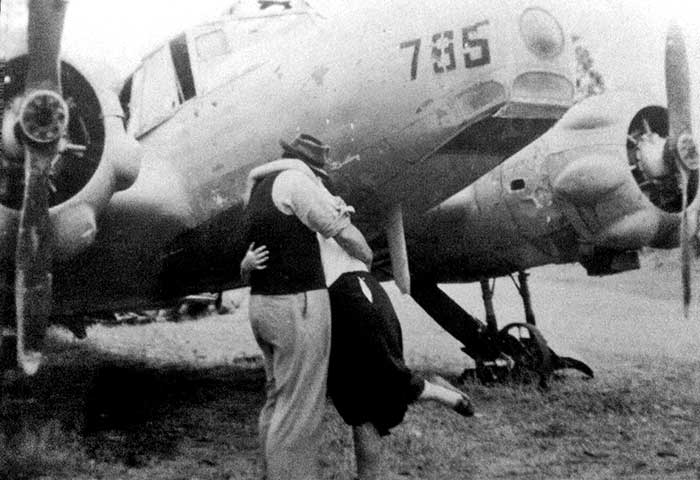 |
|||||||||||||||||||||||||||||||||||||||||||||||||||||||||||||||||||||||||||||||||
| Mr. & Mrs. Brundell at Yorketown reenact a scene from the movie "Casablanca" with their Anson MG795. Note the improvised wheels for the tow home from RAAF Port Pirie. Photo via John Boden |
|||||||||||||||||||||||||||||||||||||||||||||||||||||||||||||||||||||||||||||||||
| MG686 Bute Ex RAAF Port Pirie Mr. Malcolm Dennis, “Devon Downs” farm, Bute Yellow. By 1965 had been broken up, only fuselage frame sections and parts remained Originally one of 6 Ansons purchased from Port Pirie by Arthur Sawley, all towed to “Devon Downs” which he then owned. Dennis later purchased the property from Sawley, including Ansons MG873 & MG686 |
|||||||||||||||||||||||||||||||||||||||||||||||||||||||||||||||||||||||||||||||||
| MG813 Paskeville Ex RAAF Port Pirie Mr. R. S. Bussenschutt’s farm Yellow, nose code “813” In relatively good condition until 1965 when the farm was sold and new owner had it broken up and carted away as rubbish. By 1974 only scattered parts remained. |
|||||||||||||||||||||||||||||||||||||||||||||||||||||||||||||||||||||||||||||||||
| MG867 Kingston-on-Murray Ex RAAF Port Pirie Mr. Hunter’s fruit orchard. He towed it backwards on its wheels 300 miles from Port Pirie, crossing the River Murray on a car punt. It was broken into on the night he got it home and cockpit instruments stolen. Yellow over metal, nose code “867”. - in 1971 collected from this farm by Pearce Dunn of Warbirds Aviation Museum, Mildura Vic. Displayed in the museum compound at Mildura Airport. No restoration. - in 1980 Pearce Dunn sold MG867 to Ralph Cusack, Brisbane who was due to collect it from Mildura in December 1980. - by 1990 only parts at Mr. Hunter’s farm, including the tail section which had not been collected by Warbirds Aviation Museum. One Cheetah engine with propeller was mounted in a large stand among trees in the orchard, having been used as a wind machine to reduce frost damage to the fruit. |
|||||||||||||||||||||||||||||||||||||||||||||||||||||||||||||||||||||||||||||||||
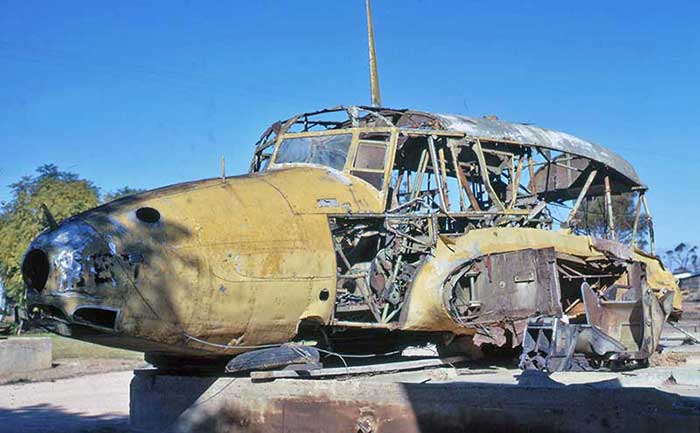 |
|||||||||||||||||||||||||||||||||||||||||||||||||||||||||||||||||||||||||||||||||
| MG867
nose code “867” at Warbirds Aviation Museum, Mildura Vic in June 1972.
Photo by Geoff Goodall |
|||||||||||||||||||||||||||||||||||||||||||||||||||||||||||||||||||||||||||||||||
| MG873 Bute Ex RAAF Port Pirie Mr. Malcolm Dennis, “Devon Downs" farm, Bute Yellow, nose code “873”. By 1966 only fuselage frame on its belly, with nose cut away. Originally one of 6 Ansons purchased from Port Pirie by Arthur Sawley, all towed to “Devon Downs” which he then owned. Dennis purchased the property from Sawley, including MG873. |
|||||||||||||||||||||||||||||||||||||||||||||||||||||||||||||||||||||||||||||||||
| MG897 Crystal Brook Ex RAAF Port Pirie Mr. A. Greig, behind his house at 5 Bowman Street on the edge of town. Yellow, nose code “897”. Large ADF loop on roof behind radio mast. Engine cowling from MG310. In 1980 Mr. Wilson purchased the remains of the Anson from Mr. Greig. Also on the farm were both Cheetahs ex LV204 with Max Koennecke at Warooka - By 2003, the remains of MG897 were a restoration project by Thomas Laucke, Cambrai SA, who also had MG521. - by 2016 Mr.Laucke still has the fuselage frames of MG897 and MG521 as an ongoing restoration project. He also has remains from EG535 and MG392 for parts. |
|||||||||||||||||||||||||||||||||||||||||||||||||||||||||||||||||||||||||||||||||
| MG898 Georgetown Ex RAAF Port Pirie Mr. Cyril Eiffe’s farm: he also purchased MG983 Yellow, code “898” |
|||||||||||||||||||||||||||||||||||||||||||||||||||||||||||||||||||||||||||||||||
| MG972 Corny Point Ex RAAF Port Pirie Mr. Don Liddiard’s farm. Mr.Lidiard had purchased this Anson around 1960 from Mr, L. H. “Hardie” Hayes of Warooka, who had run the engines for some years and taxied it around his property until a wheel went down a rabbit hole and ripped out the undercarriage leg. In 1947 5 Ansons (LV204, MG178, MG795, MG972, MH122) were towed in convoy from Port Pirie sale to Warooka by local farmers. All five were towed down the main street of Warooka on arrival. Yellow over camouflage, nose code “972”. By 1966 stripped fuselage on belly. Cheetah cowling section marked AW801 on site. By 1974 Liddiard had died and property now owned by Mr. Sherriff. Fuselage still here - Collected from this farm by John Hillier, Adelaide on 26 December 1982, and moved by road to the Adelaide suburb of Athelstone. He also has an Anson nose section from Angaston SA, and in 1984 planned to graft this better nose section to the fuselage of MG972. - by 1987 restoration had not commenced - report that remaining parts of MG972 were collected by members of Clyde North Preservation Society, Melbourne |
|||||||||||||||||||||||||||||||||||||||||||||||||||||||||||||||||||||||||||||||||
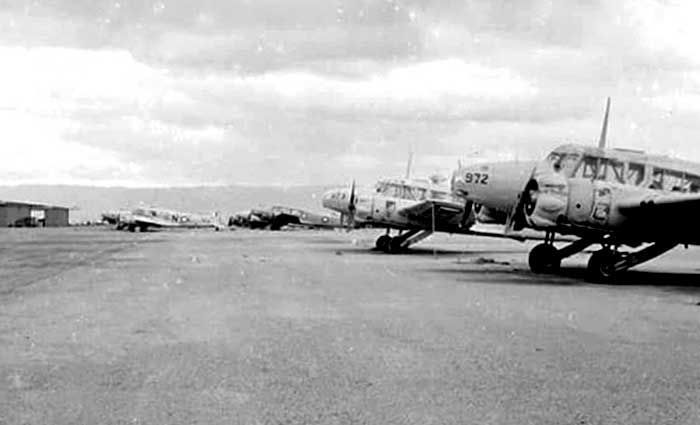 |
|||||||||||||||||||||||||||||||||||||||||||||||||||||||||||||||||||||||||||||||||
| Ansons
waiting for new owners at RAAF Port Pirie SA 1947, MG972 on right.
John Boden collection |
|||||||||||||||||||||||||||||||||||||||||||||||||||||||||||||||||||||||||||||||||
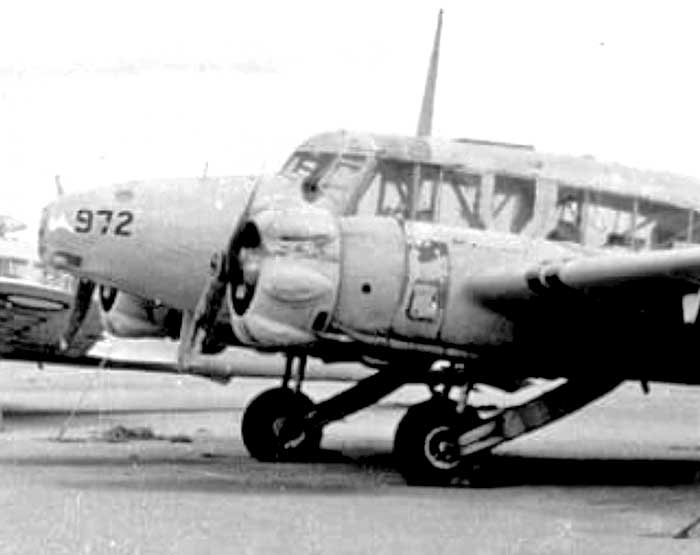 |
|||||||||||||||||||||||||||||||||||||||||||||||||||||||||||||||||||||||||||||||||
|
Close-up of MG972 shows its weather-beaten condition
|
|||||||||||||||||||||||||||||||||||||||||||||||||||||||||||||||||||||||||||||||||
| MG983 Georgetown Ex RAAF Port Pirie Mr. Cyril Eiffe’s farm: he also purchased MG898 Yellow |
|||||||||||||||||||||||||||||||||||||||||||||||||||||||||||||||||||||||||||||||||
| MG988 Whyalla Ex RAAF Port Pirie T.E.Baker, Whyalla: towed home from Port Pirie backwards behind his truck, very difficult getting its over the narrow cattle grids on the main road from Port Augusta to Whyalla. Purchased for parts. Both engines were stripped down, bearings sold to model makers, pilot control and cables used as steering for a home-made boat, wheels used on a trailer, hydraulic pump and undercarriage retraction gear were made into a hydraulic press and hoist, steel fuselage frame cut up and used to make exhaust pipes. Remaining aluminium parts were sold for scrap. When Mr.Baker moved from his property in 1955 he took all the remainder to the rubbish tip. (MG988 had earlier been a Commonwealth Disposals Commission sale from Port Pirie on 6.5.47 for £250 to Sgt R.A.Reimers, Port Pirie but cancelled 13.5.47 when MG390 was substituted.) By 1967 Mr. Baker stlll had the DAP purchase receipt for MG988 plus a set of wheels, dated 3.10.47 total price £20/7/6. |
|||||||||||||||||||||||||||||||||||||||||||||||||||||||||||||||||||||||||||||||||
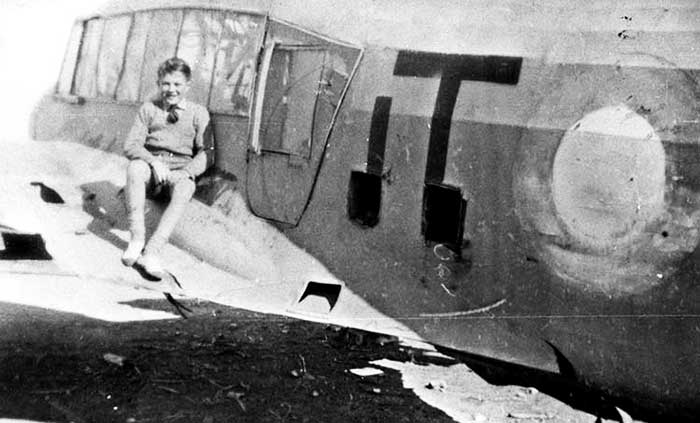 |
|||||||||||||||||||||||||||||||||||||||||||||||||||||||||||||||||||||||||||||||||
| MG988
at Whyalla, coded “T” from its days with 3AOS at Port Pirie.
Geoff Goodall collection |
|||||||||||||||||||||||||||||||||||||||||||||||||||||||||||||||||||||||||||||||||
| MH121 Port Broughton Ex RAAF Port Pirie Button’s Garage, Port Broughton. Purchased ex Port Pirie by the original garage proprietor Mr. H. Wolfe to use the BSW nuts and bolts and other parts on vehicles. Yellow By 1966 the chopped up frame sections were dumped behind the garage. The remains were dumped in the sea off Port Broughton circa 1972 |
|||||||||||||||||||||||||||||||||||||||||||||||||||||||||||||||||||||||||||||||||
| MH122 Yorketown Ex RAAF Port Pirie Mr. Bob Jung’s farm. Original purchaser was Mr. K. J. Sherriff, Yorketown. In 1947 5 Ansons (LV204, MG178, MG795, MG972, MH122) were towed in convoy from Port Pirie to Warooka by local farmers. All five were towed down the main street of Warooka on arrival. Yellow, nose code “122”. Acquired by Mr. Jung circa 1955 from Ken Sherriff who kept it on the farm next to his. By 1966 broken up for parts, just remains of fuselage. Panel marked MG795 on site. Also on Jung’s property were cowlings from Oxford HN317 |
|||||||||||||||||||||||||||||||||||||||||||||||||||||||||||||||||||||||||||||||||
 |
|||||||||||||||||||||||||||||||||||||||||||||||||||||||||||||||||||||||||||||||||
| MH122 on arrival on Ken Sherriff's farm at Yorketown 1947 with wings lashed to the fuselage. Note the improvised wheels to avoid the extra charge for Anson wheels. Photo via John Boden Junior |
|||||||||||||||||||||||||||||||||||||||||||||||||||||||||||||||||||||||||||||||||
| ANSONS LOCATED BUT NOT IDENTIFIED |
|||||||||||||||||||||||||||||||||||||||||||||||||||||||||||||||||||||||||||||||||
|
|||||||||||||||||||||||||||||||||||||||||||||||||||||||||||||||||||||||||||||||||
| RAAF AIRSPEED OXFORDS LOCATED IN SOUTH AUSTRALIA | |||||||||||||||||||||||||||||||||||||||||||||||||||||||||||||||||||||||||||||||||
| R6183 Adelaide Ex RAAF Mallala Mr. Tilley, Mitcham, Adelaide. Original purchaser was Mr. F. G. Conquest, Adelaide who towed the Oxford from Mallala to Conquest House, Mitcham which is now part of Scotch College. Tilley acquired it from Conquest. Yellow, code “179”. Nothing remained by 1965. |
|||||||||||||||||||||||||||||||||||||||||||||||||||||||||||||||||||||||||||||||||
| R6190 Second Valley Ex RAAF Mallala Mr. G. F. Krichauff’s farm, “Three Bridges”, Delamere, Second Valley Yellow, codes “164” and “90” painted in black over each other, and both visible due fading yellow paintwork. Cartoon of Superman in red and blue painted on the nose By 1953 fuselage was complete in use as a chicken house. By 1963 derelict fuselage remained, no sign of wings. Nothing left by 1965. |
|||||||||||||||||||||||||||||||||||||||||||||||||||||||||||||||||||||||||||||||||
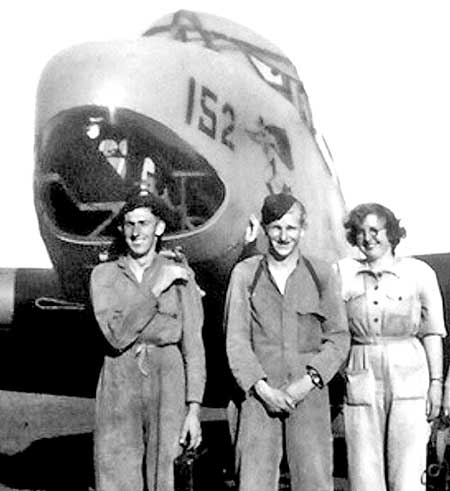 |
|||||||||||||||||||||||||||||||||||||||||||||||||||||||||||||||||||||||||||||||||
| Superman was also painted on the nose of this unidentified Oxford at Mallala. Photo: John Boden collection |
|||||||||||||||||||||||||||||||||||||||||||||||||||||||||||||||||||||||||||||||||
| R6193 Virginia Ex RAAF Mallala W.J. & F. Maloney, brothers, purchased Oxfords R6193 & BF869 Both Oxfords were moved to Jim Ryan’s service station in Virginia, where they were broken up for parts |
|||||||||||||||||||||||||||||||||||||||||||||||||||||||||||||||||||||||||||||||||
| T1131 Kapunda Ex RAAF Mallala Mr. Wally Feltus’ house in town By 1966 completely disintegrated By 1974 only parts remained, cowlings etc. By mid 1980s nothing left except one of its Cheetahs held in storage by the Kapunda Museum |
|||||||||||||||||||||||||||||||||||||||||||||||||||||||||||||||||||||||||||||||||
| V3461 Mallala Ex RAAF Mallala Mr. MacCabe’s farm Yellow, nose code “64”. Turret still installed when purchased at Mallala Remains were burnt in 1964. By 1966 only the engine cowlings remained |
|||||||||||||||||||||||||||||||||||||||||||||||||||||||||||||||||||||||||||||||||
| V3475 Nuriootpa Ex RAAF Mallala Mr. J. C. Plush’s apricot orchard Yellow, black “177” on fuselage sides and nose. By 1963 had disintegrated to a derelict centre-section, nose section, one engine and parts around the property. By 1974 in a similar state. - forward fuselage section and cowlings later collected by John Boden and stored at his house at Salisbury North, Adelaide. - forward fuselage section from behind cockpit is displayed at Nitschke’s Military & Historical Aircraft Collection at Greenock. In 2014 a complete Cheetah engine unit from an Oxford was at the museum, reportedly recently recovered. Also inside the museum is the fuselage of Anson AX350 being restored while on display. |
|||||||||||||||||||||||||||||||||||||||||||||||||||||||||||||||||||||||||||||||||
| X6732 Maitland Ex RAAF Mallala Mr. Jim Woods’ farm. This was the first Oxford towed out after the Mallala sales: he broke it up soon after and used the spruce from the wingspar for glider construction. Much of the airframe was removed by Mr. Bubner to Port Wakefield. By 1966 all that remained on Woods’ farm was pilot seat and its two main wheels attached to a trailer. In 1967 a set of cowlings from X6732 were located at Bubner’s farm near Port Wakefield. |
|||||||||||||||||||||||||||||||||||||||||||||||||||||||||||||||||||||||||||||||||
| X6842 Wasleys Ex RAAF Mallala Mr. J. W. Barker’s farm. He and his brother purchased X6842 and EB838 at Mallala, receipts dated 15.9.47. Both were moved by road to their neighbouring farms at Wasleys. Yellow, nose code “81”. Broken up and sold as rubbish in 1964 after Mr. Barker died the previous year. By 1966 all that was located on the property was a set of engine cowlings, in use as a dog house. |
|||||||||||||||||||||||||||||||||||||||||||||||||||||||||||||||||||||||||||||||||
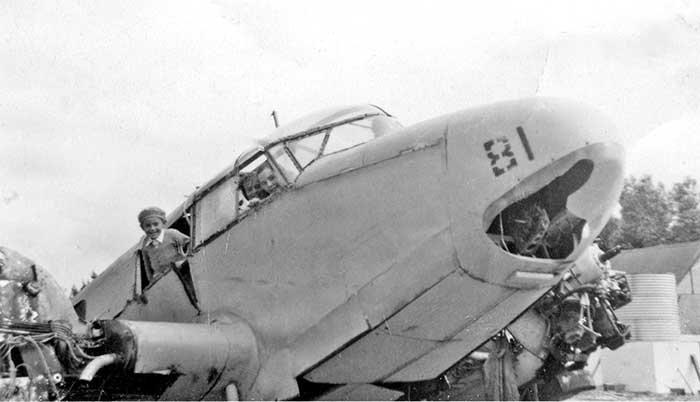 |
|||||||||||||||||||||||||||||||||||||||||||||||||||||||||||||||||||||||||||||||||
| Children
playing in X6842 on the farm at Wasleys circa
1950.
Photo: Geoff Goodall collection |
|||||||||||||||||||||||||||||||||||||||||||||||||||||||||||||||||||||||||||||||||
| X6845 Kapunda Ex RAAF Mallala Messrs M. & L. G. Matthews’ property on edge of town In 1974 the derelict centre-section was found behind a garage in town. By early 1980s nothing remained. |
|||||||||||||||||||||||||||||||||||||||||||||||||||||||||||||||||||||||||||||||||
| X6846 Tarlee Ex RAAF Mallala Mr. Wilf Geue’s farm, Bethel via Tarlee Yellow, code “153”. By 1966 all that remained were some parts, engine cowlings. A Merlin engine purchased at sales at Port Pirie was in a shed on the farm. The remaining Oxford parts were sold in a farm clearance sale about 1968. |
|||||||||||||||||||||||||||||||||||||||||||||||||||||||||||||||||||||||||||||||||
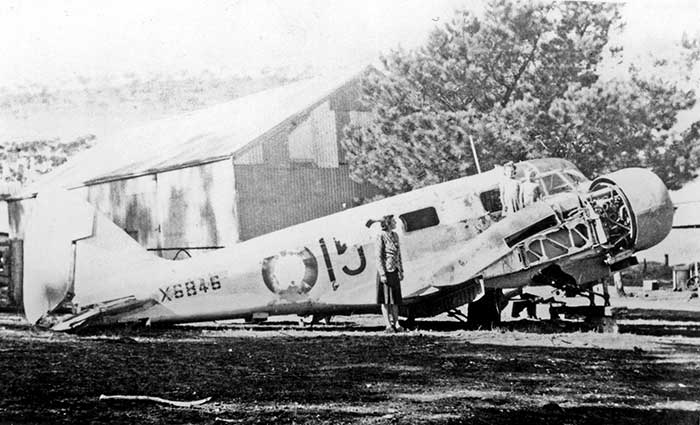 |
|||||||||||||||||||||||||||||||||||||||||||||||||||||||||||||||||||||||||||||||||
| X6846
soon after it was towed to Tarlee in
1947.
Photo: Geoff Goodall collection |
|||||||||||||||||||||||||||||||||||||||||||||||||||||||||||||||||||||||||||||||||
| X6966 Red Banks Ex RAAF Mallala Mr. Ross Verner’s farm. Parked next to Anson LT708. Yellow By 1966 the Oxford had disintegrated in the weather: identification could not be established because the engine cowlings inside which the serial would be hand-painted were being used as a nest by a mother goose, which repelled two attempts on visits 1965-66. In 1985 the Boden team found both wrecks still there. The Oxford cowling sections could be checked and had three serials: X6728, T1327 & R6966 all of which were sold from Mallala. A wing fuel tank cover was painted “966”, so on the balance of probability it has been assumed that this Oxford was X6966. |
|||||||||||||||||||||||||||||||||||||||||||||||||||||||||||||||||||||||||||||||||
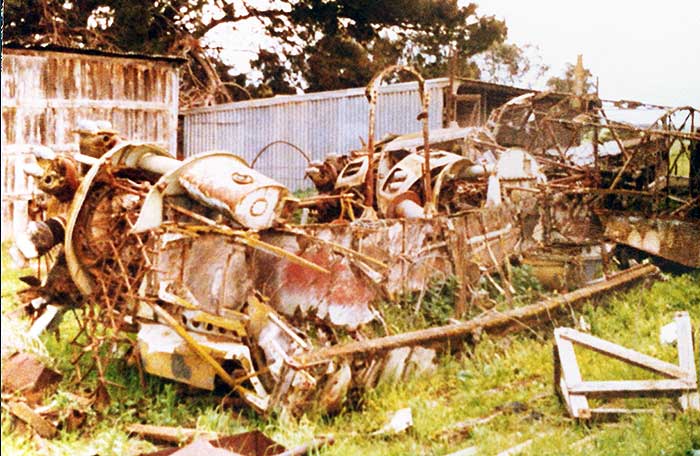 |
|||||||||||||||||||||||||||||||||||||||||||||||||||||||||||||||||||||||||||||||||
| The
disintegrated remains of Oxford X6966 in 1985, with Anson LT708
behind.
Photo by John Boden |
|||||||||||||||||||||||||||||||||||||||||||||||||||||||||||||||||||||||||||||||||
| AS309 Mount Gambier Ex RAAF Mount Gambier Mr. M. E. English, 5 Victor Street, Mount Gambier: transported to his house to be a childrens playhouse All yellow with large code “09” on fuselage. By 1974 all that remained at his house were two wing fuel tanks |
|||||||||||||||||||||||||||||||||||||||||||||||||||||||||||||||||||||||||||||||||
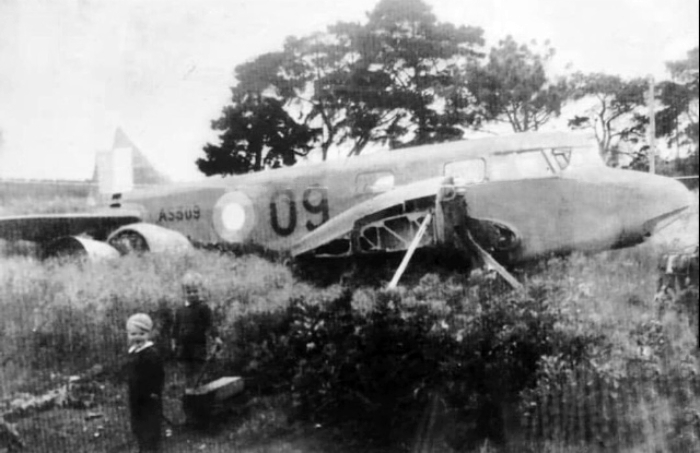 |
|||||||||||||||||||||||||||||||||||||||||||||||||||||||||||||||||||||||||||||||||
| Allover
yellow Oxford AS309 at Mr. English's home in Mount Gambier circa
1948. John Boden
collection |
|||||||||||||||||||||||||||||||||||||||||||||||||||||||||||||||||||||||||||||||||
| AS378 Agery Ex RAAF Mallala Mr. C. R. “Eric” Fuss’ farm. He also purchased HN412 from Mallala. By 1965 AS378 had been broken up, but some parts remained on the farm, including the complete cockpit perspex glasshouse stored in a shed. Mr. Fuss had kept HN412 in a barn on this property until the early 1960s when it was rolled out to the same position that AS378 had earlier occupied. Mr. Fuss was still annoyed 20 years later that HN412, which he purchased at Port Pirie had very little removed, whereas AS378 which he purchased at Mallala had both propellers, engine parts and cockpit instruments removed prior to sale. He had hoped to operate the engines of both aircraft at his farm. |
|||||||||||||||||||||||||||||||||||||||||||||||||||||||||||||||||||||||||||||||||
| AS940 Adelaide Ex RAAF Mallala Doctor C. R. Downing, 58 Anzac Highway, Everard Park: towed home behind his Jaguar car. Newspaper photo in 1947 shows fuselage in front of his suburban house: yellow, large code “56” on fuselage. 6 months after purchase the fuselage was towed behind the Jaguar to Lucindale SA where used as mobile sleeping quarters for ex servicemen clearing timbered land. The original DAP receipt was inspected by Nigel Daw: total cost £17-0-0 including main wheels and tail wheel. |
|||||||||||||||||||||||||||||||||||||||||||||||||||||||||||||||||||||||||||||||||
| BF869 Virginia Ex RAAF Mallala W.J. & F. Maloney, brothers, purchased BF869 & R6193 Both Oxfords were moved to Jim Ryan’s service station in Virginia where they were broken up for parts Yellow, code “69” |
|||||||||||||||||||||||||||||||||||||||||||||||||||||||||||||||||||||||||||||||||
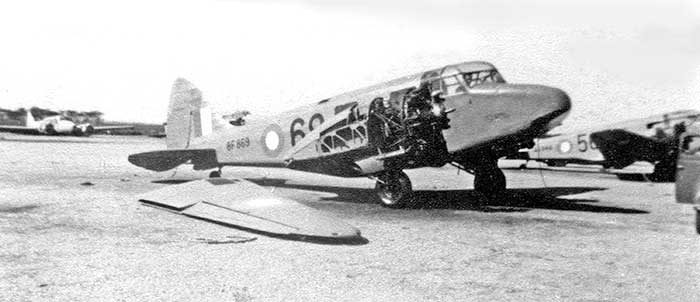 |
|||||||||||||||||||||||||||||||||||||||||||||||||||||||||||||||||||||||||||||||||
| BF869 code "69" at RAAF Mallala after the Maloney brothers had removed the outer wings. Photo: Mrs Maloney via David Vincent |
|||||||||||||||||||||||||||||||||||||||||||||||||||||||||||||||||||||||||||||||||
| BG204 Maitland Ex RAAF Mallala Robert C. McKnight: purchased for nuts and bolts and other parts that could be used in his motor garage business at Maitland. He kept it in the backyard of his house in town. Chopped up circa 1960. Yellow. By 1966 only the engine cowlings remained, used by Mrs McKnight as circular flower pots. |
|||||||||||||||||||||||||||||||||||||||||||||||||||||||||||||||||||||||||||||||||
| BG358 Sandilands Ex RAAF Mallala Dudley Edwards, “Urania" farm, via Sandilands Yellow over camouflage, nose code “168” in black By 1966 the Oxford had comopletely disintegrated, but most components remained where they collapsed. By 1974 property had been purchased by E. W. Davies and nothing remained of the Oxford. |
|||||||||||||||||||||||||||||||||||||||||||||||||||||||||||||||||||||||||||||||||
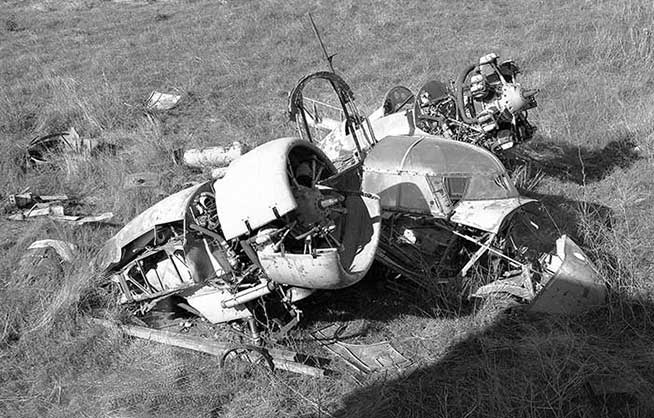 |
|||||||||||||||||||||||||||||||||||||||||||||||||||||||||||||||||||||||||||||||||
| Yellow
BG358 at Sandilands in January 1967, viewed from the roof of a farm
shed. Photo by Geoff Goodall |
|||||||||||||||||||||||||||||||||||||||||||||||||||||||||||||||||||||||||||||||||
| BG427 Maitland Ex RAAF Mallala Jim Francis’ farm near Maitland Yellow. By 1966 only one Cheetah engine remained at the farm |
|||||||||||||||||||||||||||||||||||||||||||||||||||||||||||||||||||||||||||||||||
| BM692 Greenock Ex RAAF Mallala Mr. Henry Went’s vineyard Yellow. By 1966 only engine cowlings remained. Sections had gone to Wilf Geue (X6846) By mid 1980s some parts found in a creek at the farm, plus parts of AS383 |
|||||||||||||||||||||||||||||||||||||||||||||||||||||||||||||||||||||||||||||||||
| BM709 Winulta Ex RAAF Mallala Mr. G. Deutschke’s farm Yellow By 1966 the Oxford had been burnt and scrapped. Only one Cheetah engine and some parts remained on the farm. |
|||||||||||||||||||||||||||||||||||||||||||||||||||||||||||||||||||||||||||||||||
| BM737 Adelaide Ex RAAF Mallala Mr. Jim Renfree, St Peters, Adelaide. Yellow, code “37” By 1966 had been broken up and carted away, nothing remained. Outer wings had earlier been collected by John Boden, Salisbury North, Adelaide |
|||||||||||||||||||||||||||||||||||||||||||||||||||||||||||||||||||||||||||||||||
| EB889 Adelaide Ex RAAF Mallala Mr. A. Sleep & Mr. E. R.Watson, 56 Eleventh Avenue, Woodville North, Adelaide Yellow, code “154” Towed to this address in the Adelaide suburbs, parked on its wheels in front yard of the house in 1947. Converted into a caravan and used by the Sleep and Watson families for three holidays. Then the fuselage caravan was sold locally. Wings sold separately |
|||||||||||||||||||||||||||||||||||||||||||||||||||||||||||||||||||||||||||||||||
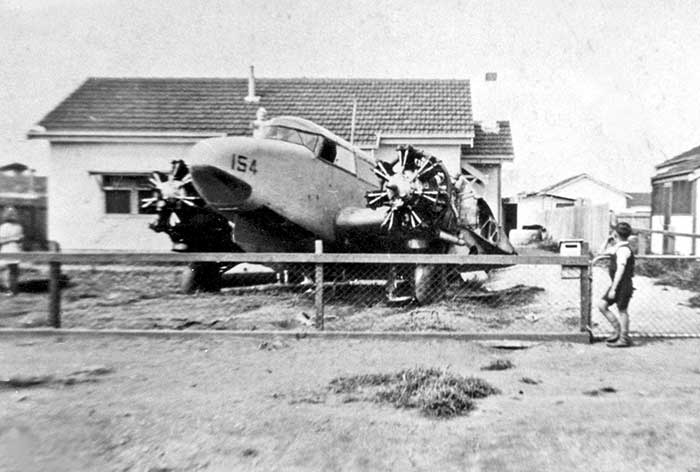 |
|||||||||||||||||||||||||||||||||||||||||||||||||||||||||||||||||||||||||||||||||
| EB889
code "154" at Woodville North, Adelaide late 1947.
Photo: Mrs. S.M.Sleep via David
Vincent |
|||||||||||||||||||||||||||||||||||||||||||||||||||||||||||||||||||||||||||||||||
| HN315 Owen Ex RAAF Mallala Mr. Wedding’s farm Yellow. By 1966 only parts and engines remained. - Later a Cheetah was collected by John Boden, Salisbury North, Adelaide |
|||||||||||||||||||||||||||||||||||||||||||||||||||||||||||||||||||||||||||||||||
| HN317 Curramulka Ex RAAF Mallala Mr. Talbot’s farm. He towed it here from Mallala Later sold an engine with cowlings to Bob Jung at Yorketown, who had Anson MH122 In 1966 Oxford cowlings with ”HN317” hand painted inside were found on Jung’s farm. |
|||||||||||||||||||||||||||||||||||||||||||||||||||||||||||||||||||||||||||||||||
| HN412 Agery Ex RAAF Port Pirie Mr. Eric Fuss’ farm. He also purchased Oxford AS378 from Mallala HN412 was towed from Port Pirie to this farm by Arthur Sawley of Bute, who had purchased 6 Ansons himself and had devised an effective towing method. Yellow, nose code “412” When found in 1965 this Oxford was parked on its inflated tyres on the farm in surprisingly good condition. Both wings outer of the engines were stacked nearby, also in good condition. Mr. Fuss had kept it inside a barn until several years earlier. Moorabbin Air Museum negotiated with Mr. Fuss to acquire HN412, but by the time they arrived with their truck a year later in 1968, local vandals had wrecked the aircraft in the preceding months. The Moorabbin team was forced to just salvage engines and parts. - in 1970s John Boden, Adelaide and his son John visited Mr. Fuss, and located airframe components from both his Oxfords AS378 & HN412 scattered around the farm. They collected a number of parts and purchased Cheetah engine spares from him. Later the Bodens donated these Oxford parts to the B-24 Liberator Restoration Fund, who were restoring an Oxford hulk in their hangar at Werribee Vic |
|||||||||||||||||||||||||||||||||||||||||||||||||||||||||||||||||||||||||||||||||
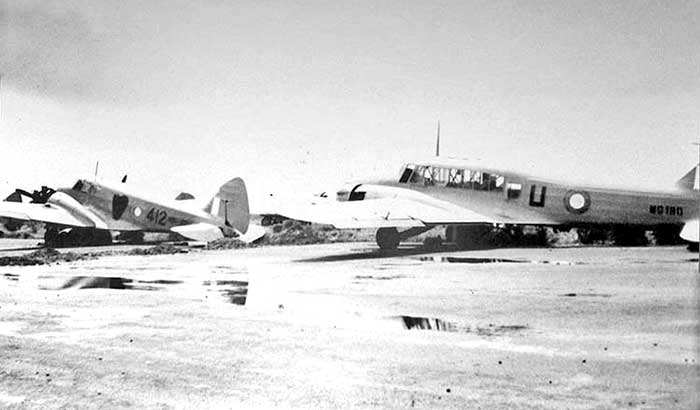 |
|||||||||||||||||||||||||||||||||||||||||||||||||||||||||||||||||||||||||||||||||
| HN412 code "412"and Anson MG190 "U" at RAAF Port Pirie after the sales, waiting to be towed away. Photo: John Boden collection |
|||||||||||||||||||||||||||||||||||||||||||||||||||||||||||||||||||||||||||||||||
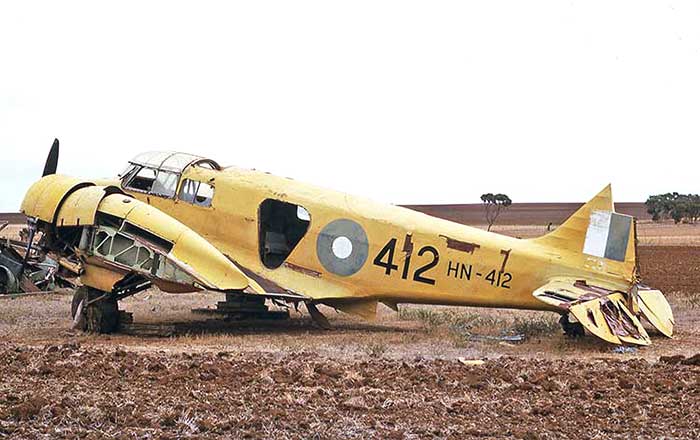 |
|||||||||||||||||||||||||||||||||||||||||||||||||||||||||||||||||||||||||||||||||
| HN412
on the farm at Agery SA in April 1965, after 15 years inside a
barn.
Photo by Neil Follett |
|||||||||||||||||||||||||||||||||||||||||||||||||||||||||||||||||||||||||||||||||
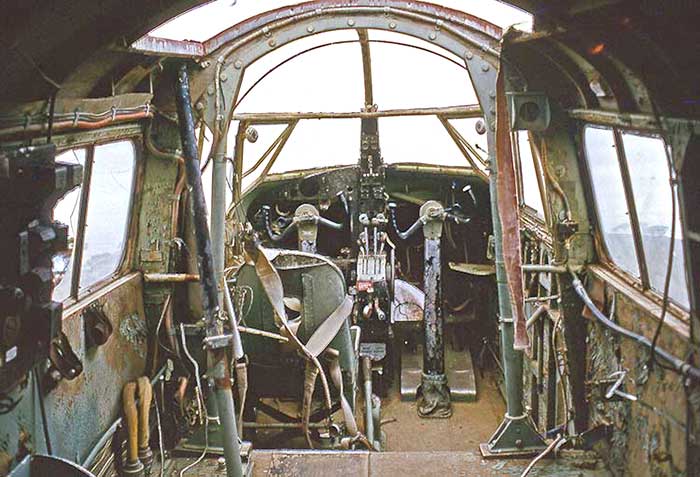 |
|||||||||||||||||||||||||||||||||||||||||||||||||||||||||||||||||||||||||||||||||
| The
Oxford's interior in April 1965.
Photo by Neil Follett |
|||||||||||||||||||||||||||||||||||||||||||||||||||||||||||||||||||||||||||||||||
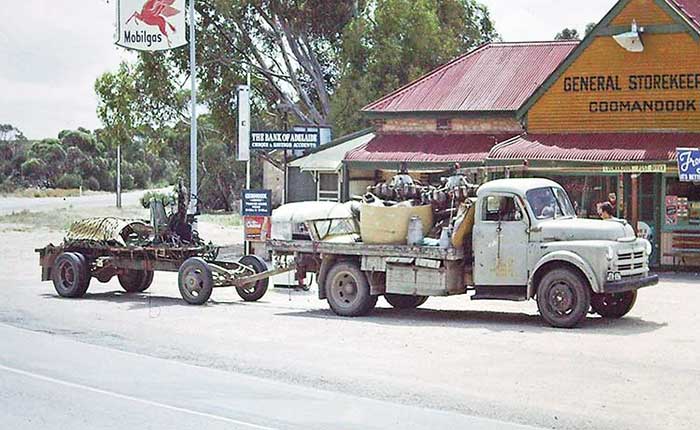 |
|||||||||||||||||||||||||||||||||||||||||||||||||||||||||||||||||||||||||||||||||
|
After HN412 was wrecked by vandals, this was all that could be salvaged by the Moorabbin Air Museum in 1968:
HN639 Tarleetwo Cheetah engines, cowlings, cockpit glasshouse, undercarriage. Photo by Terry Ellis Ex RAAF Mallala Mr. S. Nairne’s farm, Lindwood via Tarlee Yellow over camouflage, nose code “160” By 1966 the only engines and some panels and the nose fitted to a home-made hot rod car. By 1974 only cowling sections remained By early 1980s a Cheetah was found in a shed, cockpit canopy was fitted to a tractor. |
|||||||||||||||||||||||||||||||||||||||||||||||||||||||||||||||||||||||||||||||||
| HN650 Gawler Ex RAAF Mallala Mr. Ray Goble’s farm, Concordia near Gawler. Yellow, code “84”. Stripped for parts, windscreen used on a boat. Remains burnt in the mid 1950s |
|||||||||||||||||||||||||||||||||||||||||||||||||||||||||||||||||||||||||||||||||
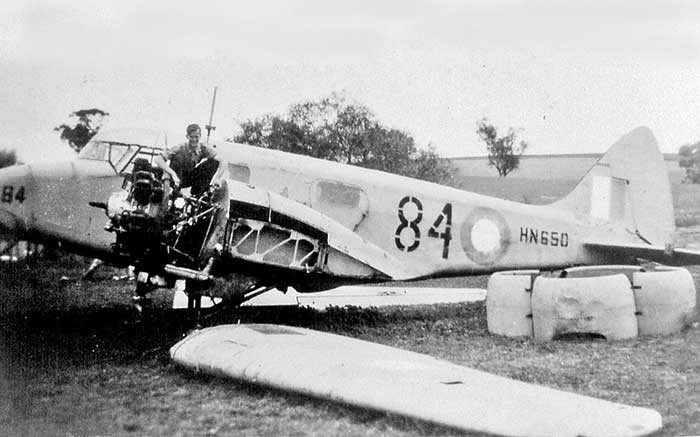 |
|||||||||||||||||||||||||||||||||||||||||||||||||||||||||||||||||||||||||||||||||
| Ray
Goble at his farm after towing HN650 from RAAF
Mallala.
Photo: John Boden collection |
|||||||||||||||||||||||||||||||||||||||||||||||||||||||||||||||||||||||||||||||||
| HN657 Sandilands Ex RAAF Mallala Mr. L. C. Gersch’s farm Yellow over camouflage. By 1966 had disintegrated, all parts where they collapsed By 1974 similar state - 5.80 two Cheetah engines from HN657 arrived at Lincoln Nitschke’s compound at Parafield Airport |
|||||||||||||||||||||||||||||||||||||||||||||||||||||||||||||||||||||||||||||||||
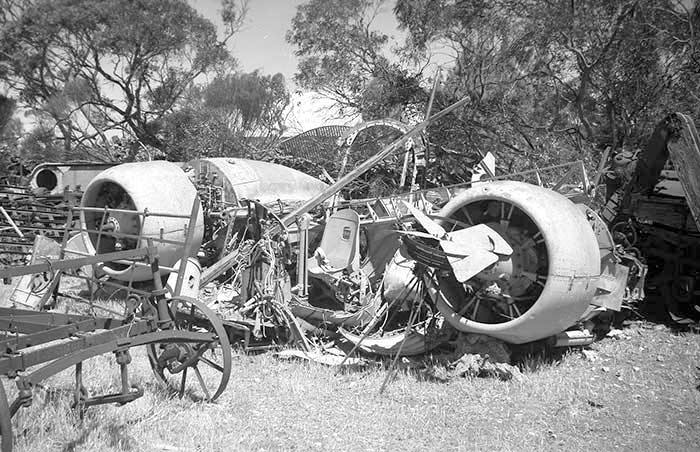 |
|||||||||||||||||||||||||||||||||||||||||||||||||||||||||||||||||||||||||||||||||
| Yellow
HN657 at Sandilands in May 1966, all the wooden airframe had
rotted.
Photo by Geoff Goodall |
|||||||||||||||||||||||||||||||||||||||||||||||||||||||||||||||||||||||||||||||||
| LX181 Sandilands Ex RAAF Mallala Mr. R. Launer, “Ronwyn” farm, Sandilands Yellow over camouflage. By 1966 wooden airframe had disintegrated, all parts where they collapsed. By mid 1980s nothing left |
|||||||||||||||||||||||||||||||||||||||||||||||||||||||||||||||||||||||||||||||||
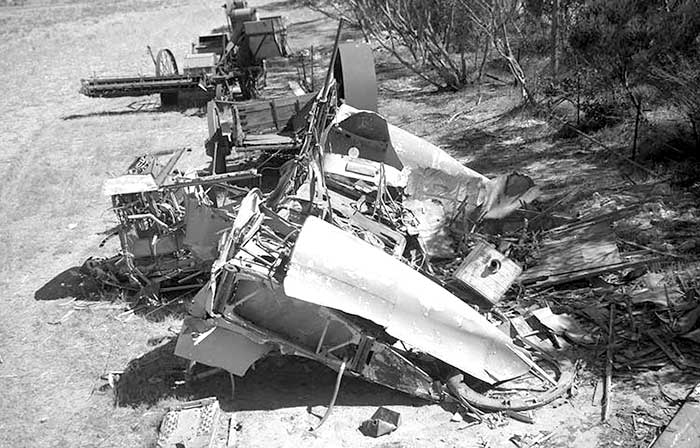 |
|||||||||||||||||||||||||||||||||||||||||||||||||||||||||||||||||||||||||||||||||
| Yellow LX161 in May 1966, typical of many Oxfords found, wooden airframe disintegrated due to weather exposure. Photo by Geoff Goodall |
|||||||||||||||||||||||||||||||||||||||||||||||||||||||||||||||||||||||||||||||||
| OXFORDS LOCATED BUT NOT IDENTIFIED |
|||||||||||||||||||||||||||||||||||||||||||||||||||||||||||||||||||||||||||||||||
|
|||||||||||||||||||||||||||||||||||||||||||||||||||||||||||||||||||||||||||||||||
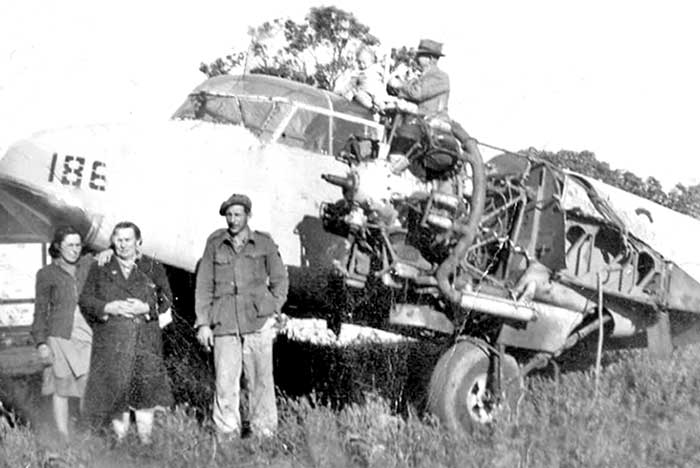 |
|||||||||||||||||||||||||||||||||||||||||||||||||||||||||||||||||||||||||||||||||
| Unidentified
Oxford "186"on a farm at Balaklava SA circa
1949.
John Boden collection |
|||||||||||||||||||||||||||||||||||||||||||||||||||||||||||||||||||||||||||||||||
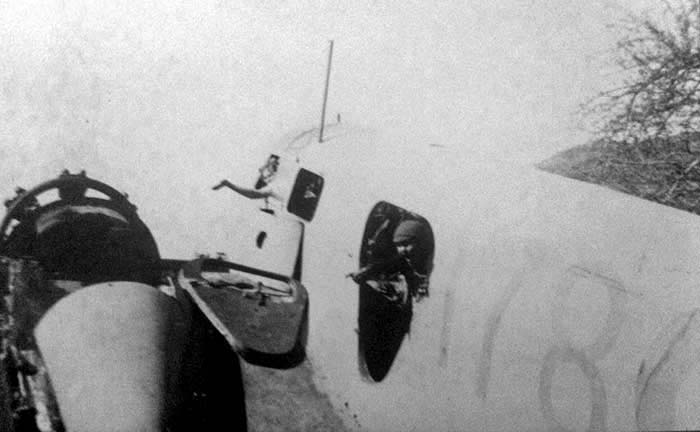 |
|||||||||||||||||||||||||||||||||||||||||||||||||||||||||||||||||||||||||||||||||
| Mr. Roenfeldt's unidentified Oxford at Greenock, fuselage code "178" being used by young boys for war games John Boden collection |
|||||||||||||||||||||||||||||||||||||||||||||||||||||||||||||||||||||||||||||||||
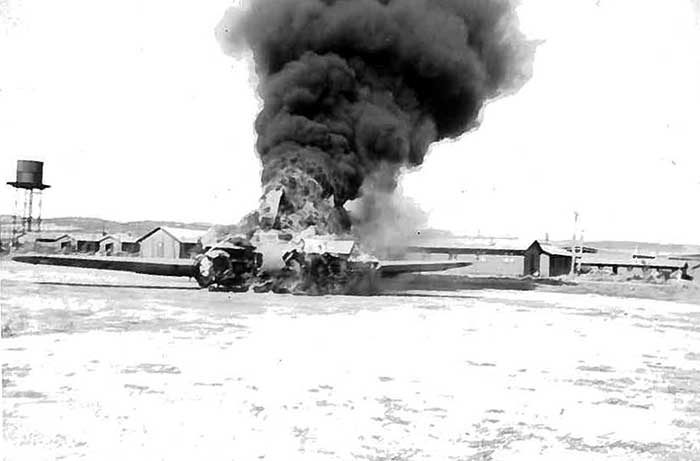 |
|||||||||||||||||||||||||||||||||||||||||||||||||||||||||||||||||||||||||||||||||
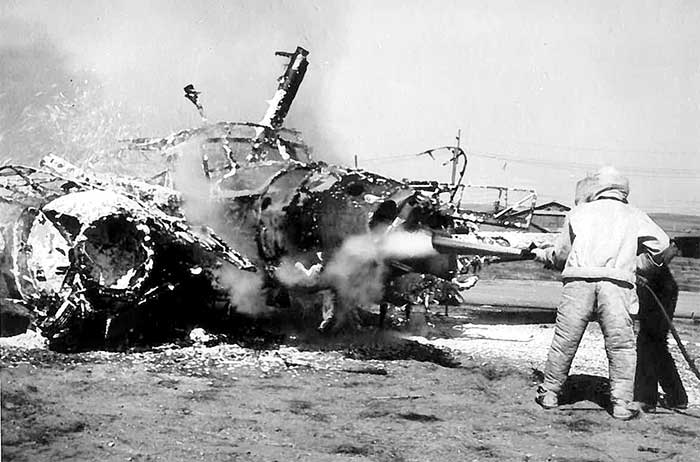 |
|||||||||||||||||||||||||||||||||||||||||||||||||||||||||||||||||||||||||||||||||
| References: |
|||||||||||||||||||||||||||||||||||||||||||||||||||||||||||||||||||||||||||||||||
| Based
on notes recorded by Nigel Daw, David Vincent, Melvyn Davis, John
Smith, Geoff Goodall, John Boden and his son John during extensive travel across
South Australia from 1964 to present date. My special thanks to John Boden (Junior) for his ongoing support and excellent detective work. |
|||||||||||||||||||||||||||||||||||||||||||||||||||||||||||||||||||||||||||||||||
| - RAAF Airframe Record Cards (Form E/E.88) for Ansons and Oxfords - RAAF Historical Section: listings for Ansons and Oxfords - RAAF Historical Section: research by Melvyn Davis - National Library of Australia Trove Australian newspaper search website |
|||||||||||||||||||||||||||||||||||||||||||||||||||||||||||||||||||||||||||||||||
| - South Australian Air Journal, monthly: January 1964: SA Wrecks & Relics April 1964: SA Wrecks and Relics Pt.2 |
|||||||||||||||||||||||||||||||||||||||||||||||||||||||||||||||||||||||||||||||||
| - Australian Air Log, monthly journal: April 1966: WBAG A Go Go May 1966: WBAG A Go Go (continued) June 1966: More Ansons and Oxfords August 1966: Wild Goose Chase November 1966: Even More Ansons and Oxfords December 1966: Wrecks and Relics Crawl |
|||||||||||||||||||||||||||||||||||||||||||||||||||||||||||||||||||||||||||||||||